
| Centre Name: |

Centre for Learning and Teaching (CLT) (http://clt.research.utar.edu.my/Home.php) |
| Chairperson: | Assistant Professor Dr. Wei Chooi Yi |
| Description of Centre: | The Centre for Learning and Teaching aims to cultivate and promote research and scholarship in the area of Learning and Teaching. Its objectives are:
|
| Research area: |
|
| NO. | NAME | FACULTY | MEMBER |
|---|---|---|---|
| 1 | Mr Yeoh Hong Beng | FSc | Full Membership |
| 2 | Assistant Professor Dr Siew Pei Hwa | FCI | Full Membership |
| 3 | Ms Er Pek Hoon, Winnie | FAM | Full Membership |
| 4 | Assistant Professor Dr Gerard Sagaya Raj a/l A Rajoo | FAS | Full Membership |
| 5 | Ms Geetha Veerappan | FAS | Full Membership |
| 6 | Assistant Professor Ir. Dr. K. Chandrasekaran | FEGT | Full Membership |
| 7 | Associate Membership Professor Dr Cheah Phaik Kin | FAS | Full Membership |
| 8 | Mr. Mohd FAMir Izuddin bin Mohamad Ghazali | FAS | Full Membership |
| 9 | Assistant Professor Dr Lee Jer Vui | LKC FES | Full Membership |
| 10 | Ms Diong Fong Wei | FAS | Full Membership |
| 11 | Mr Fernando Paulo Da Costa Andrade | LKC FES | Full Membership |
| 12 | Ms Beh Hooi Ching, Michelle | LKC FES | Full Membership |
| 13 | Assistant Professor Dr Muliyati Binti Mat Alim | FAS | Full Membership |
| 14 | Ms Nur Asyrani binti Che Ismail | FAS | Full Membership |
| 15 | Assistant Professor Dr Priscilla a/p Moses | FCI | Full Membership |
| 16 | Pn Norlis binti Ismail | FAS | Full Membership |
| 17 | Pn Nur Aizuri binti Md Azmin | FAS | Full Membership |
| 18 | Ms Ong Sheau Wen | FAS | Full Membership |
| 19 | Cik Siti Ummaizah Binti Meor Musa | FAS | Full Membership |
| 20 | Ms Malvin Kaur a/p Kunden Singh | FAS | Full Membership |
| 21 | Ms Bharathi a/p Mutty | FAS | Full Membership |
| 22 | Mr Cheah Kok Sung | FAS | Full Membership |
| 23 | Ms Liew Feng Mei | FBF | Full Membership |
| 24 | Assistant Professor Ts Dr Anbuselvan a/l Sangodiah | FICT | Full Membership |
| 25 | Assistant Professor Dr Manoranjitham a/p Muniandy | FICT | Full Membership |
| 26 | Assistant Professor Ts Dr Lim Ean Heng | FICT | Full Membership |
| 27 | Ms Viji A/P Ramamuruthy | FAS | Full Membership |
| 28 | Ms Surindar Kaur A/P Gurmukh Singh | FAS | Full Membership |
| 29 | Ms Saraswathy A/P Thurairaj | FCI | Full Membership |
| 30 | Assistant Professor Dr. Noor Azmira binti Mohamed | FAS | Full Membership |
| 31 | Ms A.Avene a/p Atputharaj | FAS | Full Membership |
| 32 | Assistant Professor Dr Tan Pei Meng | FAM | Full Membership |
| 33 | Pn Nurullashkeen Binti Mohd Anis | FAS | Full Membership |
| 34 | Assistant Professor Dr Ngeow Yeok Meng | FCI | Full Membership |
| 35 | Assistant Professor Dr Chen Kah Pin | LKC FES | Full Membership |
| 36 | Ms Kok Hui Meian, Jass | FAS | Full Membership |
| 37 | Ms P Kangathevi a/p Ponnudorai | FAS | Full Membership |
| 38 | Assistant Professor Ts Dr. Wong Pei Voon | FICT | Full Membership |
| 39 | Mr Chin Ying Shin | FAS | Full Membership |
| 40 | Ts Dr Karunanithy a/l Degeras | FSc | Full Membership |
| 41 | Ms Kristina a/l Francis | FAS | Full Membership |
| 42 | Assistant Professor Ts Dr Lim Seng Poh | FICT | Full Membership |
| 43 | Ts Yong Tien Fui, Albert | FICT | Full Membership |
| 44 | Assistant Professor Dr Sharon Jacqueline a/p Albert Wilson | FCI | Full Membership |
| 45 | Ms Cheryl a/p Chelliah Thiruchelvam | FAS | Full Membership |
| 46 | Ms Ranjini a/p Kunalan | FAS | Full Membership |
| 47 | Ms Chia Mei Si | FBF | Full Membership |
| 48 | Ts Khairul Rizuan bin Suliman | FSc | Full Membership |
| 49 | Pn. Emma Marini binti Abd Rahim | FCI | Full Membership |
| 50 | Mr. Mohan a/l Selvaraju | FSc | Full Membership |
| 51 | Ms Teh Su Yen | FAS | Full Membership |
| 52 | Ts Lim Jit Theam | FICT | Full Membership |
| 53 | Assistant Professor Dr. Sumathi A/PRenganathan | FAS | Full Membership |
| 54 | Mr Lee Chee Heong | CFS, Perak | Associate Membership |
| 55 | Assistant Professor Dr Charanjit Kaur a/p Darshan Singh | FCI | Associate Membership |
| 56 | Pn. Juliana binti Abu Bakar | FBF | Associate Membership |
| 57 | Ms. Thavamalar a/p Ganapathy | FBF | Associate Membership |
| 58 | Ms. Chitrah a/p Krishnan | FBF | Associate Membership |
| 59 | Ts Tan Lee Siew | CFS, Kampar | Associate Membership |
| 60 | Ms Ooi Siew Fong | CFS, Kampar | Associate Membership |
| No. | Date | Event |
|---|---|---|
| 1 | 15 January 2020 (4pm) | CLT Talk on “Becoming a passionate edu-tainer”,Conducted by Mr Zachary Roland a/l A.F. Anthony, Department of Media, Faculty of Creative Industries, Venue: UTAR Kampar Campus Perak, Malaysia.
Link: https://news.utar.edu.my/news/2020/Jan/22/01/01.html |
| 2 | 19 February 2020 (9 - 1pm) | CLT Workshop on “Implementing gamification to enhance teaching and learning”, Conducted by Ms Kristina a/p Francis & Mr Mohd Amir Izuddin bin Mohamad Ghazali, Department of Languages and Linguistics, Faculty of Arts and Social Science, Venue: UTAR Sungai Long Campus Link: https://news.utar.edu.my/news/2020/March/02/01/01.html |
| 3 | 3 April 2020 | CFAS lecturer delivers guest lecture for USA students via Zoom – conducted by Associate Professor Dr. Cheah Phaik Kin Department of Public Relation, Faculty of Art and Social Science. Platform: Zoom Link: https://news.utar.edu.my/news/2020/April/07/01/01.html |
| 4 | 2 & 9 May 2020 (2 - 4pm) | CLT Virtual Workshop “Online workshop to enhance e-teaching” to Chinese Independent High School teachers, Conducted by Assistant Professor Ts. Dr. Chen Kah Pin, Head of Centre for Curriculum Development and Innovation (CCDI), Platform: Microsoft Team & Zoom
Link: https://news.utar.edu.my/news/2020/May/27/01/01.html |
| 5 | 5, 6, 10 & 11 June 2020 (10-12 noon) | CLT Forum for Online Teaching and Learning (OTL) 1.0 on “An up-close forum on OTL” , Platform: Microsoft Team Link: https://news.utar.edu.my/news/2020/June/30/01/01.html This forum also reported in press by The Sun Daily: Title: UTAR forum on e-learning experience, The Sun Daily, Education Focus, Page 9, 11 August 2020 Link: https://www.thesundaily.my/supplement/edu/utar-forum-on-e-learning-experience-YF3421463 |
| 6 | 13 June 2020, (10.00 am - 12.00noon) | CLT Talk on “Enhancing OTL with Pen Tablet”, conducted by Mr. Eugene Foo Shyang Eu,Department of Multimedia Design and Animation, Faculty of Creative Industries, Platform: Zoom Link: https://news.utar.edu.my/news/2020/June/18/01/01.html |
| 7 | 26 June 2020,(10am -12 noon) | CLT Webinar on “Education during and after COVID-19: Irresistible online-education trend” by Associate Professor Zhuang Yan, School of Finance, Harbin University of Commerce, China, Platform: VooV Meeting Link: https://news.utar.edu.my/news/2020/July/03/01/01.html This webinar also reported in press by Sin Chew online: Title: “The Development of Online Education in China Universities and the Trend of Future Teaching Reform under the Epidemic”(疫情之下,中国大学在线教育发展及未来教学改革趋势) Reported by Sin Chew online Link: https://www.sinchew.com.my/content/content_2310397.html |
| 8 | 24 July 2020 (10.30 - 11.30am) | CLT Discussion session on “Lively discussion on education technology by educational experts”, Platform: UTAR FB Live Link: https://news.utar.edu.my/news/2020/Aug/03/02/02.html |
| 9 | 10, 13, & 14 August 2020 (10-12noon) | CLT Forum for Online Teaching and Learning (OTL) 2.0 on “ UTAR holds OTL Forum 2.0 to enhance digital teaching skills”, Platform: Microsoft Team Link: https://news.utar.edu.my/news/2020/Sept/08/01/01.html |
| 10 | 21 November 2020 (9am - 1 pm) | Participation in the UTAR First Virtual Cross-disciplinary R&D Colloquium 2020, CLT as session chair for the theme of Educational Tourism. Platform: Microsoft Team Link: https://news.utar.edu.my/news/2020/Nov/30/01/01.html |
| 11 | 12 December 2020 (2.30 - 4.30pm) | CLT Webinar on “Challenges of Teaching Online in the Post-Pandemic Era”, Platform: Zoom Link: https://news.utar.edu.my/news/2021/Jan/08/02/02.html |
| 12 | 1 November - 20 December 2020 | PCLT organising “ 3 Minutes Video Competition: Innovative Young Educator” to promote STEM through virtual competition. Link: https://news.utar.edu.my/news/2020/Dec/21/02/02.html |
| No. | Date | |
|---|---|---|
| 1 | CLT Talk on “Becoming a passionate edu-tainer”,Conducted by Mr Zachary Roland a/l A.F. Anthony, Department of Media, Faculty of Creative Industries, Venue: UTAR Kampar Campus Perak, Malaysia.
In the effort to understand the expanding roles of educators, a talk titled “Creating a Passionate Edutainer” was organised by Centre for Learning and Teaching (CLT) on 15 January 2020 at UTAR Kampar Campus. Present at the talk were invited speaker and Faculty of Creative Industries academic Zachary Roland Anthony, CLT Chairperson Dr Wei Chooi Yi, Organising Chairperson Prashanth Beleya, staff and students. While navigating through rapid technological developments and evolving needs of students, the pressure for educators to keep abreast with the learners are increasing. In view of that, Zachary emphasised that the need to find a niche between being an educator and entertainer is now becoming a necessary qualification. Therefore, the talk also focused on helping participants, especially academics to learn ways to balance the scale between being an educator and entertainer. He also shared his experience on how edutainer should focus on the needs of the students without losing the emphasis of the teaching content. He firstly defined an edutainer as someone who teaches while entertaining the students. “As an edutainer, we have to share highly relevant and appealing information and knowledge to make learning interesting for our students. At other times, as an edutainer, we also empower and encourage our students to reflect and to seek their own answers. That way our students are able to learn the skills to be responsible for their lives, which benefits their learning and personal development as well,” explained Zachary. Another role of an edutainer, explained by the speaker, was to do things interestingly to match the thought process of the young generation, where the edutainer is able to share, convince and inspire the students. “Teaching is no longer the same as it was in the past. Today, we need to also understand what students want, which is no longer the top-down or talk-down approach. They want a performer in the classroom who is able to share knowledge in the most interesting ways possible. Therefore, it becomes more important for educators to improve their passion. In other words, it also involves ways to help impact the lives of others, while you enjoy the adventure and risks incorporated. It is also about being in the company of passionate and positive people. As an edutainer, we consider ourselves as learners as well, whereby we share our knowledge interestingly,” said the speaker. He also advised participants to be honest, professional and accountable for one’s passion, be ready to change the pattern or routine, while being mindful that the aim is not to be a perfectionist but to be passionate with one’s responsibility. Further emphasising the need to be an edutainer, Zachary highlighted the benefits of edutaining, which included engaging audiences while learning; connecting with role models; increasing attention; and stimulating intellectual thinking. On ways to edutain, the speakers listed stories, drama, jokes, movies, music, games and news as the many creative tools to make classes more interesting for students. “The formula is easy; be simple, be relative, be impressive, be humble and be happy. A takeaway tip is to respect, understand and accept our students. You want to be able to relate to them at a level where they too can respect, understand and accept you. A tried and tested way is to change our attitude and reshape our behaviour, then we will form a desirable character,” advised Zachary. |

Fourth from left: Dr Wei, Zachary, Prashanth with the organising committee 
An insightful day at the talk |
| 2 | CLT Workshop on “Implementing gamification to enhance teaching and learning”, Conducted by Ms Kristina a/p Francis & Mr Mohd Amir Izuddin bin Mohamad Ghazali, Department of Languages and Linguistics, Faculty of Arts and Social Science, Venue: UTAR Sungai Long Campus
The Centre for Learning and Teaching organised a workshop called “Workshop on Digital Tools for Teaching” also known as Gamification Workshop at UTAR Sungai Long Campus on 19 February 2020. The workshop aimed to enhance the teaching methods of UTAR Faculty of Creative Industries (FCI) lecturers. The talk was conducted by Faculty of Art and Social Science (FAS) Department of Languages and Linguistics lecturers Kristina Francis and Mohd Amir Izuddin bin Mohamad Ghazali. Mohd Amir began the workshop by explaining the meaning of gamification. He mentioned that gamification can be very interesting; it is a process of taking something that is existing and integrating the game mechanics to motivate and create engagement for the students. Mohd Amir also shared the differences between games and gamification. According to him, gamification is good to amplify the students’ learning experience, promote active learning and motivate them extrinsically and intrinsically. It also brings benefits to the lecturers and students as gamification makes learning fun, gives students challenges to solve and provides them a reason to learn. Kristina then continued by giving examples of gamification to enhance the participants’ teaching skills. She made her own custom-made board games and tags as teaching aids to enhance students’ learning interest. Kristina also shared the tools for gamification and urged the FCI lecturers to give it a try. The tools included Biteable, Kahoot, Quizizz and Padlet. She then conducted a role play with the lecturers by using Flipgrid. Flipgrib is a free tool that is easily available. This tool helps to engage every voice in the classroom by recording and sharing short and awesome videos. It can also be used to create presentational videos. The session saw active participation from the lecturers. Souvenir presentation and group photo sessions were held before the workshop adjourned. |
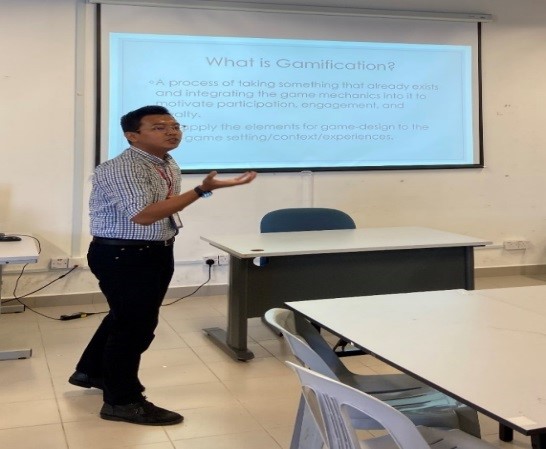
Mohd Amir explaining gamification 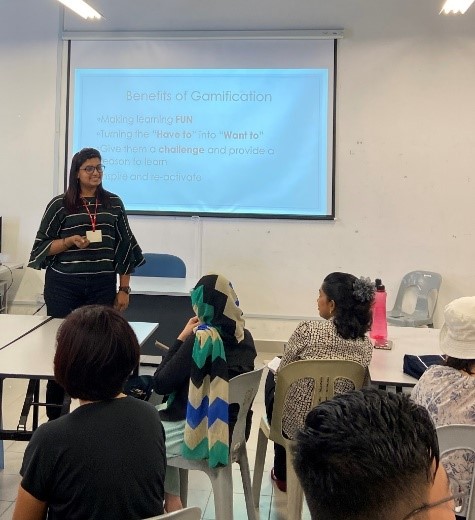
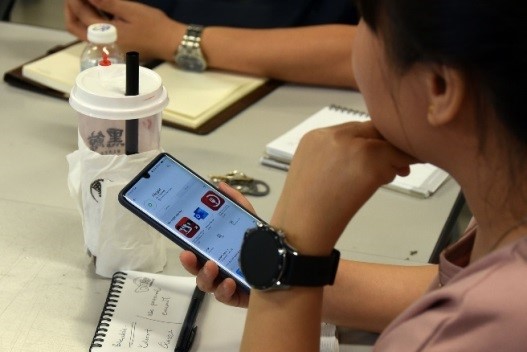
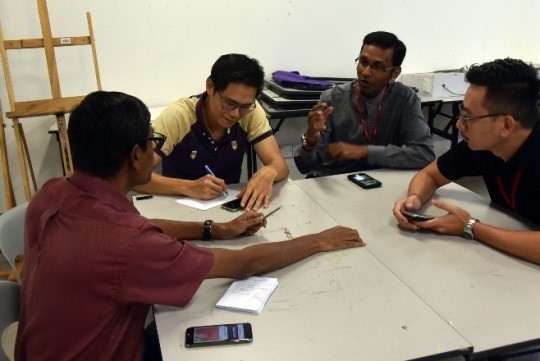
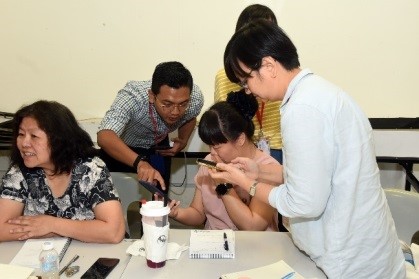

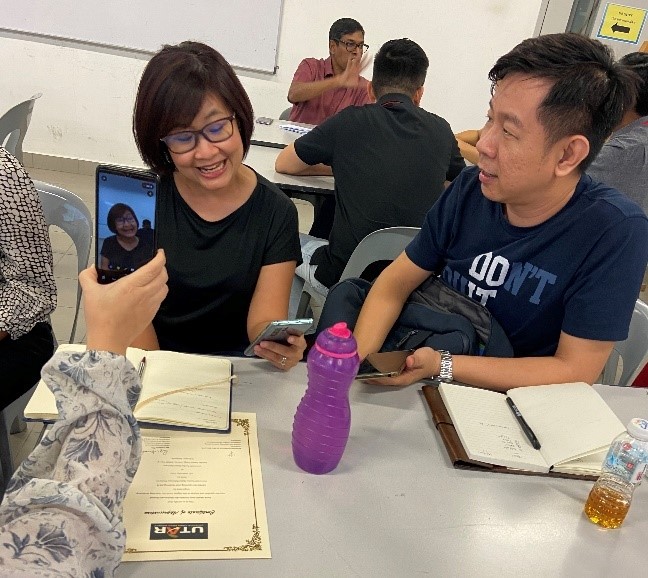
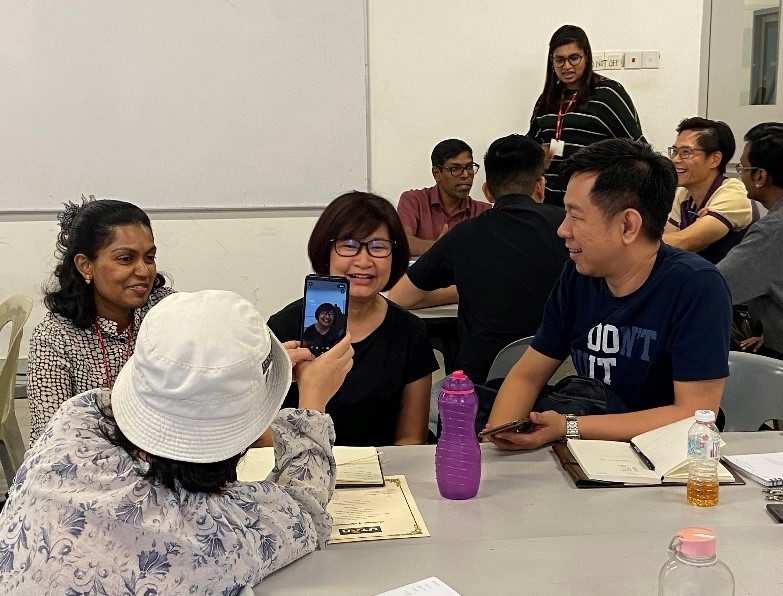
Participants actively participating and enjoying the role-play session at the workshop 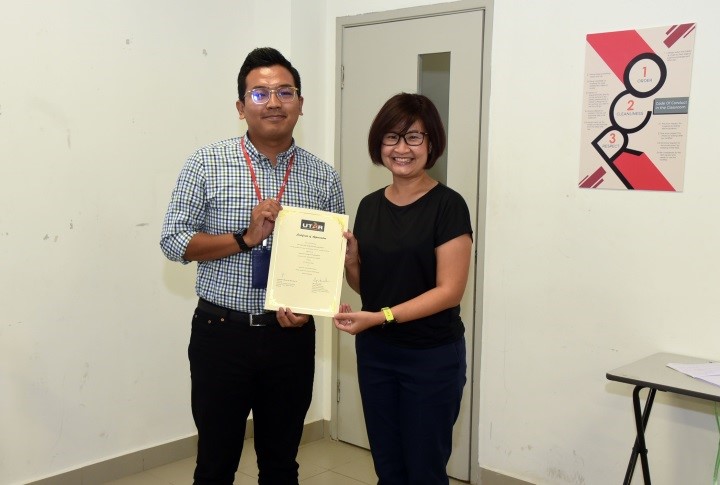
Department of Mass Communication Head Cynthia Lau Pui-Shan (right) presenting a certificate of appreciation to Mohd Amir 
Department of Mass Communication Head Cynthia Lau Pui-Shan (right) presenting a certificate of appreciation to Kristina Francis 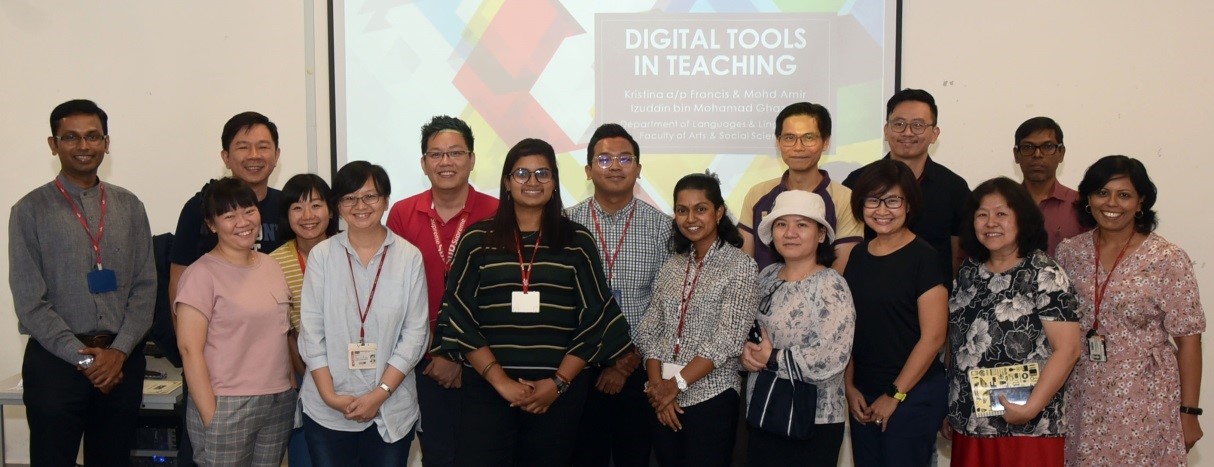
Kristina (front row, fourth from left) and Mohd Amir (back row, fourth from right) with the workshop participants |
| 3 | FAS lecturer delivers guest lecture for USA students via Zoom – conducted by Associate Professor Dr. Cheah Phaik Kin Department of Public Relation, Faculty of Art and Social Science, Platform: Zoom
Assoc Prof Dr Cheah Phaik Kin from the Department of Public Relations of UTAR Faculty of Arts and Social Science delivered a guest lecture, titled “Media in Malaysia” to a group of 13 Global Communication students of Texas Christian University (TCU), Fort Worth, Texas, United States of America (USA) on 3 April 2020 via Zoom. The lecture was hosted by Assoc Prof Dr Amiso M. George of the Department of Strategic Communication, Bob Schieffer College of Communication, TCU. Dr Amiso is also the external examiner for UTAR’s Bachelor of Communication (Hons) Public Relations programme since 2017. Three of the students who attended the lecture will be graduating with their Bachelor of Science in Strategic Communication in August, while 10 are at different stages of the Master of Strategic Communication programme at TCU. Dr Cheah explained, “My lecture was supposed to be held on 18 March 2020 as I was scheduled to attend a conference as well as a lecture at TCU, USA. However, the trip had to be cancelled due to COVID-19 situation in Malaysia and USA that was escalating.” She added, “Dr Amiso had announced to her students and colleagues about my visit. Hence, we were all looking forward to meeting up during the trip. I did not want to disappoint them, so I thought of the idea to do an online class instead.” During the lecture, Dr Cheah introduced Malaysia’s history and constitutions, and also its cultural and media landscape to TCU students. Dr Amiso enthused, “While I would have liked to see Dr Cheah in person and show her some TCU and Texas hospitality, I am grateful that she was still able to guest lecture to my students via Zoom. The students learned directly from a Malaysian media expert and they are richer from that experience.” One of the students, Savannah Horton said, “Dr Cheah brought a global perspective to our class that helped reinforce why it was important to learn about other cultures and the way societies use communication, particularly during this difficult time where communication is vital.” Another student, Andrew Berry, who is also a Master of Strategic Communication student said, “It was a pleasure to hear Dr Cheah talk about Malaysia's communication and media culture. As a Public Relations professor, she brought a specialised lens and perspective to our conversation on global communication. Although we had many differences, she still taught us about press releases and other common practices that were truly transboundary.” Kay Barkin added, “While there are many challenges to attend graduate school during COVID-19, one of the benefits is the opportunity to hear from knowledgeable people who can take us to places, beyond our isolation. Dr Cheah’s presentation about media and communication in Malaysia was enlightening.” Another Master of Strategic Communication student, Thao Pham said, “It was very interesting to learn about Malaysian history and culture and how they impact the country's media system. I thought I was somewhat aware of the country's diversity as I visited Malaysia a few years ago, but I did not expect it to have such a huge influence. So my takeaway from Dr Cheah's very informative presentation is that, as public relations and communication practitioners, who may serve clients overseas, we need to investigate the cultural and political context of the region where we are going to send out our message to avoid not only cultural backlash but also to protect ourselves from serious legal offences. And it was fun to end the class by learning how to sing a traditional Malaysian song. It brightened up my day.” Last but not least, a graduating Strategic Communication student Savanna Hubbard said, “Dr Cheah’s presentation provided a well-rounded view of the modern Malaysian culture and media, informed by its history and made vibrant by personal anecdotes.” |
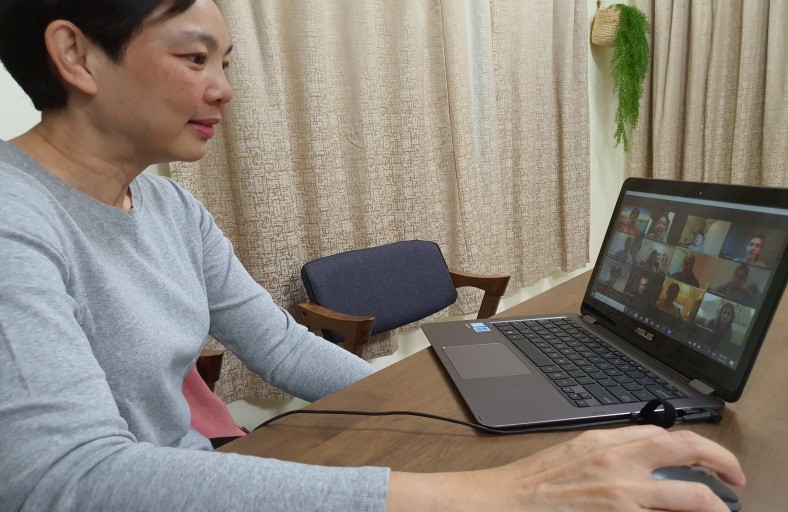
Dr Cheah conducting a guest lecture via Zoom 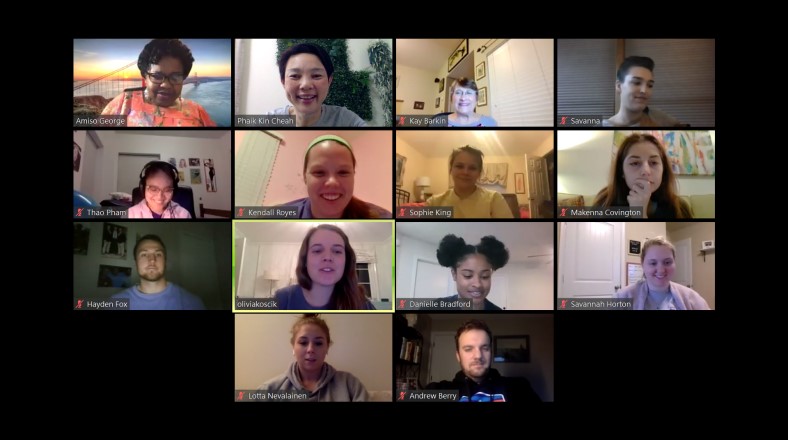
Students engaging in the class conducted by Dr Cheah and hosted by Dr Amiso 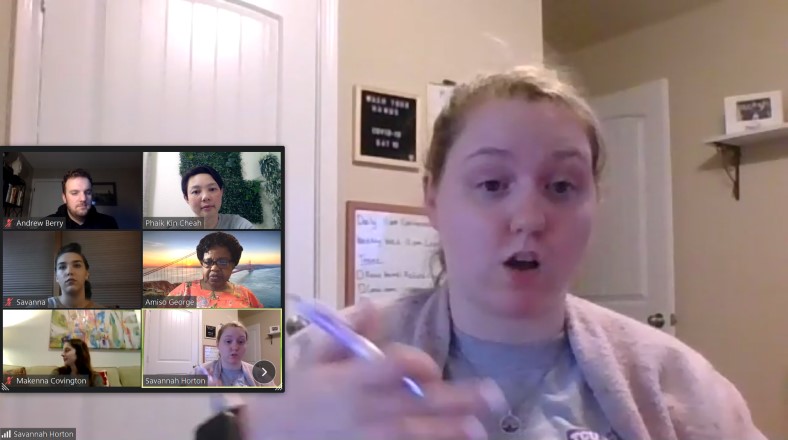
One of the students, Savannah Horton, asking a question to Dr Cheah during the lecture |
| 4 | CLT Virtual Workshop “Online workshop to enhance e-teaching” to Chinese Independent High School teachers, Conducted by Assistant Professor Ts. Dr. Chen Kah Pin, Head of Centre for Curriculum Development and Innovation (CCDI), Platform: Microsoft Team & Zoom
Ever since the Movement Control Order (MCO) and Conditional Movement Control Order (CMCO) were introduced, the school education has changed from face-to-face teaching to online teaching. Thus, the relationship between teaching and learning has changed dramatically. This may be an important opportunity to promote education reform in Malaysia. Therefore, the question lies in whether or not our educators are ready to face the opportunities and challenges under the new norm - suspending classes without stopping learning? UTAR and the United Chinese School Committees’ Association of Malaysia (Dong Zong) co-organised a special online teaching (e-teaching) workshop on video software Zoom and Microsoft Teams to help the teachers from Chinese independent high schools to master the necessary online learning resources and tools. The online workshop was conducted by UTAR Centre for Curriculum Development and Innovation Head Ts Dr Chen Kah Pin, on every Saturday for two weeks. It started on 2 May 2020. Dr Chen said that, while ensuring the orderly progress of education, the large scale online teaching during this epidemic had formed a new learning ecology. He introduced two common ways of online teaching, namely synchronous and asynchronous teaching, and said, “The synchronous teaching requires teachers and students to be present online simultaneously. The teaching process will be carried out through live broadcast platforms such as Zoom and Microsoft Teams, providing an effective way for teachers to interact with students in real time. While asynchronous teaching allows teachers to record in advance and upload teaching videos before the class. This method is convenient for students to study and review at any time.” “As a tool for online teaching, Zoom and Microsoft Teams have their own specialisation which allows teachers to teach online easily. In terms of functionality, Microsoft Teams has many functions that can support the actual needs of teachers’ online teaching compared to Zoom or other professional video software. Microsoft Teams allows users to access files in the cloud, share files, create questionnaires and test questions, and use Microsoft Office software such as Word, Excel, PowerPoint and others to enhance the teaching and learning experience,” he added. Furthermore, he also demonstrated and explained the functions and usage of Zoom and Microsoft Teams platforms besides providing solutions to problems encountered by participants during their teaching progress. The workshop received great responses from the educators of Chinese independent high schools around the nation. Online learning is gradually becoming the mainstream of education. Hence, UTAR is following the pace of trend to specifically create a platform for collecting and organising information about online learning resources and tools to help teachers obtain useful teaching information and also provide convenience for the general public to view and learn more about e-learning. |

Dr Chen sharing his online teaching experience with the participants |
| 5 | CLT Forum for Online Teaching and Learning (OTL) 1.0 on “ An up-close forum on OTL” , Platform: Microsoft Team
Participants were left enriched after attending the “Online Teaching and Learning (OTL) Forum: My Personal OTL Journey”, co-organised by Centre for Curriculum Development and Innovation (CCDI) and Centre for Learning and Teaching (CLT) on 5, 6, 10 and 11 June 2020. The forum was hosted on Microsoft Teams. With the aim to provide academics a platform to share their best and effective practices in teaching initiatives and e-learning pedagogies via online platforms, the forum saw invited speakers from various faculties of UTAR sharing their personal experiences on OTL. As the speakers shared, participants learnt the ways to overcome OTL challenges and the new things discovered with students during OTL. The participants also learnt different types of interactive activities that can be conducted during their OTL to ensure the provision of resourced-filled, effective, engaging and meaningful learning experiences for their students. The first session discussed topics on OTL using social media, ICT setup for OTL, and on using Class Notebook in Microsoft Teams. The panellists consisted of Faculty of Engineering and Green Technology (FEGT) Assoc Prof Ir Dr Yeap Kim Ho, Faculty of Information and Communication Technology (FICT) Department of Computer Science Head Ts Dr Ooi Boon Yaik, and Centre for Foundation Studies (CFS) of Kampar Campus lecturer Lee Chee Heong. The forum was moderated by Kampar Campus’ Institute of Postgraduate Studies and Research Deputy Director Assoc Prof Dr Sumathi Sethupathi. On using social media for OTL, Ir Dr Yeap firstly defined social media as interactive computer-mediated technologies that facilitate the creation or sharing of information, ideas, career interests and other forms of expression via virtual communities and networks. He also listed the popular social media platforms that were used for non-education and education purposes. He added by comparing some of the social media’s features, advantages and disadvantages. He then listed the platforms that he used throughout his OTL, which were WhatsApp, Microsoft Teams, Zoom, and Skype. He explained that WhatsApp and Microsoft Teams were mainly used for dissemination of knowledge, tests assessments, presentation assessments and academic meeting. For research meeting, he used Zoom, while Skype was used for presentation assessments. “For my personal OTL, the Movement Control Order (MCO) issued by the government called for a sudden pedagogical shift and the time for adjustment for both me and the students was short. So when considering the use of social media for OTL, I looked into the aspects of accessibility, and platforms that were common and highly familiar as well as user-friendly. Certainly, there were challenges and the problems I faced, one of which included taking the attendance of students because I couldn’t tell if the students were there. There was also the lack of physical interaction and it was more difficult to observe facial expressions, gestures and idiosyncrasies, which are important attributes in gauging understanding. We were also missing physical laboratory exercises and I had to consider investing in some drawing tools,” explained Ir Dr Yeap. Lastly, he also noted, “OTL is indeed catalysing the pedagogical shift and the roles of instructors are changing from “sage on the stage” to “guide on the side”. It is also worth exploring appropriate tools for OTL, although there is no perfect tool for it. I have also learnt that there are still some elements in physical teaching that cannot be replaced. Therefore, OTL is not so much about the technology that we are using. It is on how effective we could use the technology to convey and assimilate knowledge.” “ICT setup for OTL” was explained by Ts Dr Ooi, who elucidated further on connectivity, camera and microphone, and computer. He explained the differences between conferencing one-to-one and many-to-one. He listed the connectivity options, which were broadband (ADSL), cellular network (3G/4G) and Fiber Optics, and advised participants to look into the price, quota and speed (bandwidth) when choosing the type of connectivity. Ts Dr Ooi advised to get closer to the WiFi Access Point and use 5GHz instead of 2.4 GHz to improve Wifi. “When choosing a camera, it would be best to avoid using the built-in camera on your laptops. I would also advise against the awkward placement of camera and cameras that are not ergonomic. Instead, you can try using a USB camera or webcam because it provides a wider angle, better angle flexibility and even allows user to do close-up demonstrations. To improve the quality of video and audio, you can use your mobile phone and its paired default headphones with microphone, or you can also get an adjustable tripod stand to hold your phone. If possible, you can also consider doing a shared screen with your laptops,” advised Ts Dr Ooi. He added, “For older computers, make sure that your operating system is up-to-date, and that its firewall is properly configured. Now that we are conducting classes online, it would be best to always update your OTL software. If your applications are loading slower, try opening them before the start of the class, plan ahead to avoid switching applications unnecessarily, and avoid plugging-in or removing devices during your class.” Lee, on the other hand, did a live demonstration on using OneNote in Microsoft Teams. He said one of the interesting features of OneNote is its ability to generate individual notebook for students, which allows them to do their own editing on their respective notebook. While demonstrating the features and functions of OneNote, Lee also explained how he used this software to conduct his classes online. It also attracted various questions from participants who wished to know further about using OneNote for their OTL. Session two was moderated by CCDI Head Ts Dr Chen Kah Pin, with the presence of panellists consisting of Faculty of Creative Industries’ (FCI) Department of Multimedia Design and Animation Specialist Eugene Foo Shyang Eu, Lee Kong Chian Faculty of Engineering and Science (LKC FES) Academic Dr Khaw Mei Kum, and CFS Sungai Long senior lecturer Amelia Chiang Kar Mun. It discussed topics on video streaming software, ways to retain students’ attention and conducting online quizzes effectively. “I personally used Zoom, Microsoft Teams, and Discord for my OTL and I found that the majority of my students preferred Zoom, and their least preferred software was Skype. I’ve also used various sources and tools for my OTL, but the centrepiece was Facebook. Some other sources and tools I used included Pinterest, Vimeo, Wetransfer, Google Drive and even Youtube. For screen captures, I have used Flashback Express and OBS, while for mind mapping or idea development; I have used Mindmeister and AYOA,” explained Foo. He also added, “So in reviewing all these software I have used, I have come up with a strategy for my students next semester. Before the lecture, I plan to give students pre-recorded Youtube Tutorials that are maximum 20 minutes long. If the video is longer, then I may consider splitting the video into two. During the lecture, I would quiz them on the tools by providing them with an image and evaluate their capabilities in replicating that image. After the breaks, I will do recaps to address problem areas. For after-lecture, tutorials will be assigned and it can be done in a group or individual. More importantly, they get to learn from one another.” On ways to retain students’ attention during OTL, Dr Khaw advised participants to keep the class simple. “Don’t repeat everything from the voice-over slides, and instead cover the important or difficult parts during the live lecture. Students actually want to have discussions and they want more examples given during the lecture. The second method involves making the lectures interesting, for instance using videos or animation to give a better explanation to the students. You can also use WBLE 2 to make learning more interactive for students as it allows hands-on practical learning,” said Dr Khaw. “I have also used memes to attract students’ attention. It is also important to gather feedback from students. So, from time to time, after every sub-topic or 15 minutes, I will check with my students to see how well they are doing in that class. I would also call our students randomly and ask an easy question, but do note not to put your students on the spot. Also, avoid close-ended questions, long questions, as well as irrelevant and vague questions. I would recommend you to take short breaks in between the lectures, and you can use these breaks to take questions from any students,” explained Dr Khaw. “For conducting online quizzes, I have used WBLE, Microsoft Teams and Kahoot. What I have noticed when using WBLE for online quizzes, apart from it being free, it allows me to easily track students’ progress and the tests can be taken from various devices, however, student engagement is low when using this platform. The same advantages and disadvantages were found on Microsoft Teams. For Kahoot, it was the opposite, as student engagement was high, but it was difficult to track their progress,” explained Chiang. She went on explaining the objective of conducting online quizzes and mentioned that online quizzes enable lecturers to create assessments quickly and easily. She also said that online quizzes make learning more enjoyable for the students, and the quizzes are more closely aligned to the type of assessment used at tertiary educational institutions. “Overall, I find online quizzes to be useful and it could be a part of the proposed plan in Teaching Plan and Course Report in order to improve the corresponding Course Outcomes. These online quizzes are also likened to impromptu assessments to test the effectiveness of the lessons conducted. Perhaps, you can even consider using online quizzes as an alternative of assessment, rather than assessing only through assignments or presentations,” said Chiang. CCDI Deputy Head Dr Ngeow Yeok Meng moderated session three, with the presence of speakers, namely FCI Academic Dr Sharon Jacqueline Albert Wilson, Faculty of Accountancy and Management Deputy Dean for R&D and Postgraduate Programmes Dr Pok Wei Fong and FCI’s Department of Modern Languages Head Maxwell Sim Yik Seng. It discussed topics on building rapport remotely, copyright and plagiarism, and OTL for English language teaching. “Building rapport with students can make a difference when you teach. When you develop a rapport with your students, you are also building trust with them. At times you can use humour and use the opportunity to know your students outside of the classroom. Building rapport can not only help to better understand the background of your students, but it also helps with classroom management and instruction. Consider building rapport with your students as the development of a positive relationship between you and your students. Some of the techniques I have used are geared towards the beginning of the course, where others are techniques that can be used on a day to day basis,” explain Dr Sharon. She listed five ways to build rapport with students, which were availability, responsiveness and reliability; knowledge; effectiveness; advocacy, and care and concern. She explained how she used the breaks in between classes to play songs that students selected and to use that time to build non-class conversations. “Students also appreciate it when you give them acknowledgement and after class, you can encourage chat session, which I find my students enjoyed. Online classes do not mean that eye contact is not required. So one way for me is to elevate the laptop so students can see me better. Lastly, a note to remember in building rapport with students is to show our human side,” said Dr Sharon. When Dr Pok spoke about copyright and fair use practice, she included the definition of Intellectual Property; implications of copyright in education; UTAR’s handbook on HR policies and regulations; fair use; four factors of fair use evaluation; and open sources. “Why do we care about copyright in education? Because copyright owner has the rights of reproduction, rights of communication to the public, rights to perform, showing or playing to the public, rights of distribution and rights of commercial rental. So we need to get permission to use it if lecturers are not the copyright owner. Fair use, on the other hand, is a legal doctrine that says you can reuse copyright-protected material under certain circumstances without getting permission from the copyright owner. Educational institutions can enjoy the fair use doctrine for educational purposes,” said Dr Pok. The four factors of fair use evaluation mentioned by Dr Pok were the purpose of use; nature of the copyrighted work; amount and substantiality, and harm to the profit of the creator. “In a nutshell, it would be advisable to create your own content, use open resources, ensure fair use, and ask for permission to reuse or reproduce if you have to,” advised Dr Pok. Sim shared his personal experience teaching English language using online platforms. He mentioned the need to search for the right platform to deliver his online classes, and advised participants to make plans for implementing delivery, assessment and evaluation. He also learnt to be more patient when conducting OTL and to prompt students gently. Session four was moderated by CLT Chairperson Dr Wei Choo Yi. The panellists consisted of Faculty of Arts and Social Science (FAS) Deputy Dean for Academic Development and Undergraduate Programmes Ts Dr Khor Kheng Kia, Centre for Accounting, Banking and Finance Chairperson Dr Nurul Afidah binti Mohamad Jusob @ Mohamad Yusof and FAS Academic Kristina Francis. It discussed topics on engaging students online, handling large classes, and OTL interactive tools. “The ICT tools I used for my OTL are Adobe Premier, sound recorder, CamStudio, and ZoomIt. I have also created a WhatsApp group for my students. I look into the humanized pedagogy, whereby it respects and uses the reality, history and perspectives of students as an integral part of educational practice. It also avoids generic teaching methods that often objectify students and strip them of their own values and ideals. This pedagogy also establishes a teacher-student relationship through sharing and co-creation of knowledge. Looking at the challenges ahead, I am also looking into using ice-breaking in OTL, gamification of learning and apply flipped classroom pedagogy,” explained Dr Khor. For Dr Nurul, she shared about the challenges she faced, the lessons learnt from her personal OTL journey, as well as her future plans for OTL. “The first challenge was, of course, the emotional detachment. When the emotional connection is missing, especially via OTL, it makes conveying information more difficult and building rapport also becomes more difficult. Class management was also one of the challenges because it is hard to detect students’ cues; whether they were paying attention or not. And then there is also to tech support and management issues as well,” said Dr Nurul. “So from this OTL experience, I have learnt to loosen up a bit, and take things in a more fun approach. I also learnt to change my unrealistic expectation because not everything is as per our perceived expectation. For instance, students may be eating during the online classes, but I can accept that because they are still attending their class and for me, that is good enough. It is also important to prepare materials for large classes. An additional thing that I have learnt is to be more engaged, for instance using hand gestures and various intonations. It would also be good to learn and use more e-learning tools, especially those that could accommodate a high number of students. I also found that some of the e-learning tools make lessons more appealing to students and attracts higher interest in the subject,” explained Dr Nurul. She also advised participants to encourage discussion and feedback from their students. She also suggested inviting guest speakers as it would change the dynamic of the class, and students will be able to gain more practical and off-textbook application and knowledge. Kristina enlightened the participants with an explanation on the Industrial Revolution and its impacts on education. “We see future workers being required to be trained in emerging technologies. We will also see in the future that we not only need to possess the ability to develop the technology, but to also know whether, when and where to use that technology. So this brings us to educational technology, which is the effective and efficient use of technology in the learning process,” explained Kristina. She mentioned that educational technology encompasses e-learning, instructional technology, information and communication technology, multimedia learning, Technology Enhanced Learning (TEL), Computer Based Instruction (CBI) and Computer Based Training (CBT), as well Virtual Learning Environment (VLE). The challenges of educational technology as listed by Kristina were assembling and maintaining the team; security, privacy and public access, and access constraint. Other challenges include the limitations of training; teachers’ attitude and belief towards the use of technology, and the accessibility to technology from home. “The first solution to these challenges is to conduct cyber monitoring to filter out inappropriate or offensive content, and to educate students on ways to use technology more wisely. Providing training for teachers is also important so they become aware and are updated on the technologies used in education. Certainly, the administration must provide support so that educational technology can be done smoothly. The teacher’s mindset must also be aligned with technology and not against,” advised Kristina. Lastly, she also mentioned that blended learning will be required, for instance, the use of gamification in OTL. “Gamification makes learning fun for the students and it turns the “Have to” into “Want to”. It also gives them a challenge and provides them with a reason to learn, and even inspire and reactive their learning,” said Kristina. |
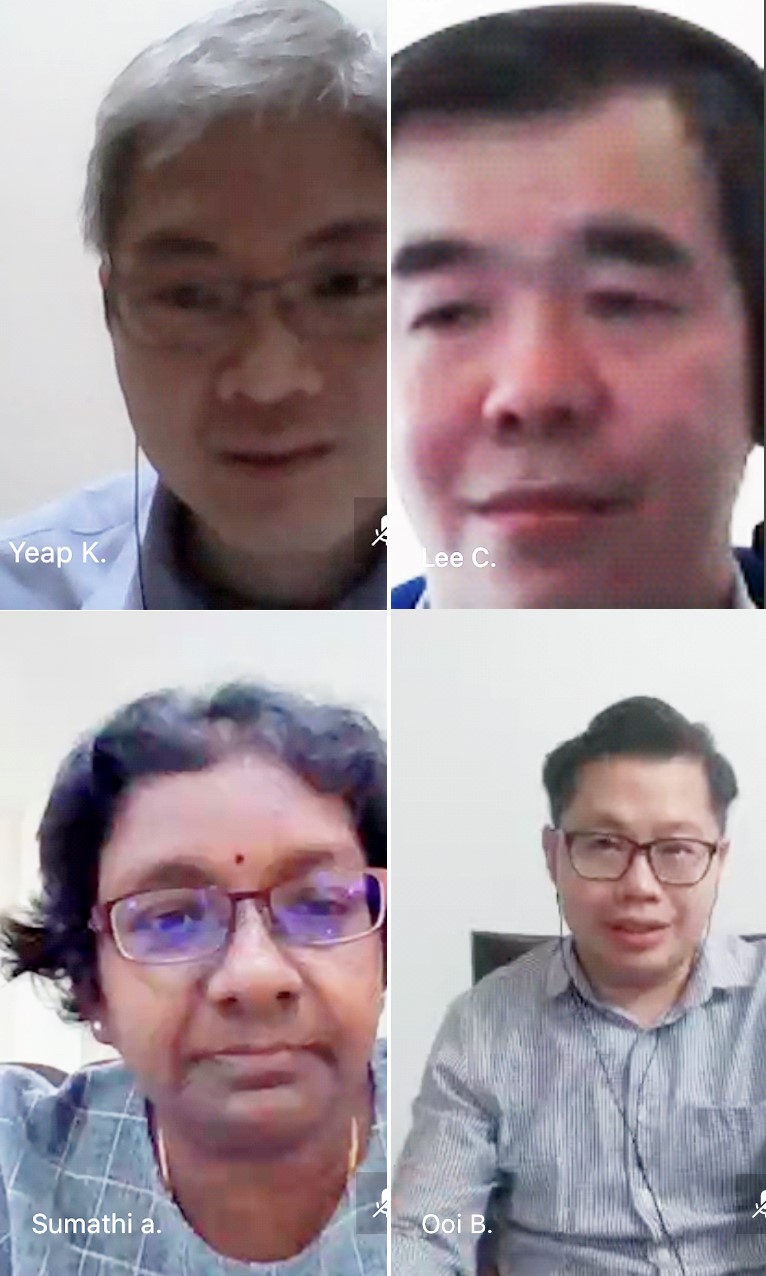
Clockwise from top left: Ir Dr Yeap, Lee, Ts Dr Ooi and Dr Sumathi 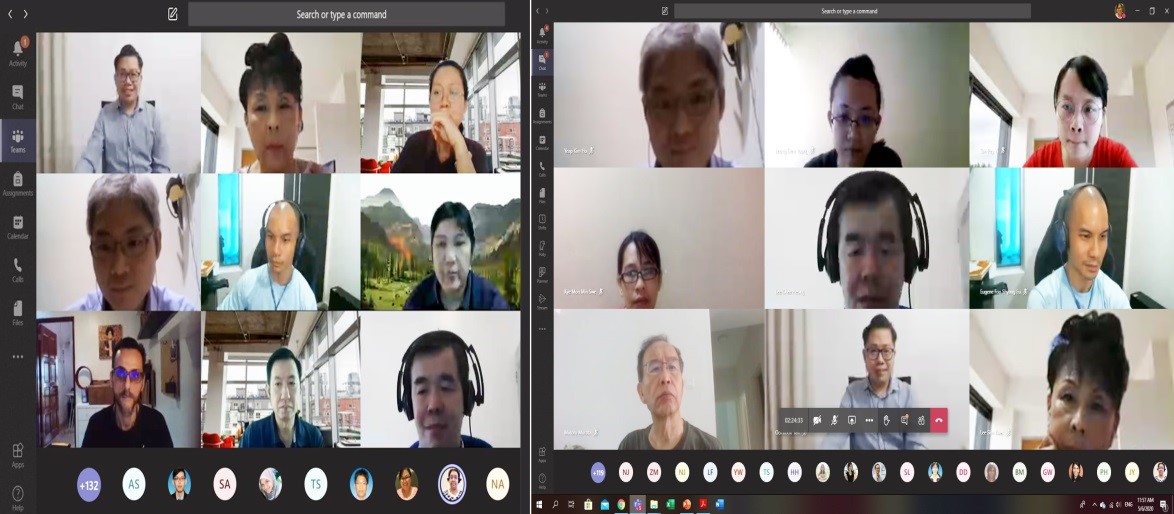
Some of the participants with the speakers of session one 
Clockwise from top left: Chiang, Dr Khaw, Foo and Ts Dr Chen 
Some of the participants with session two speakers 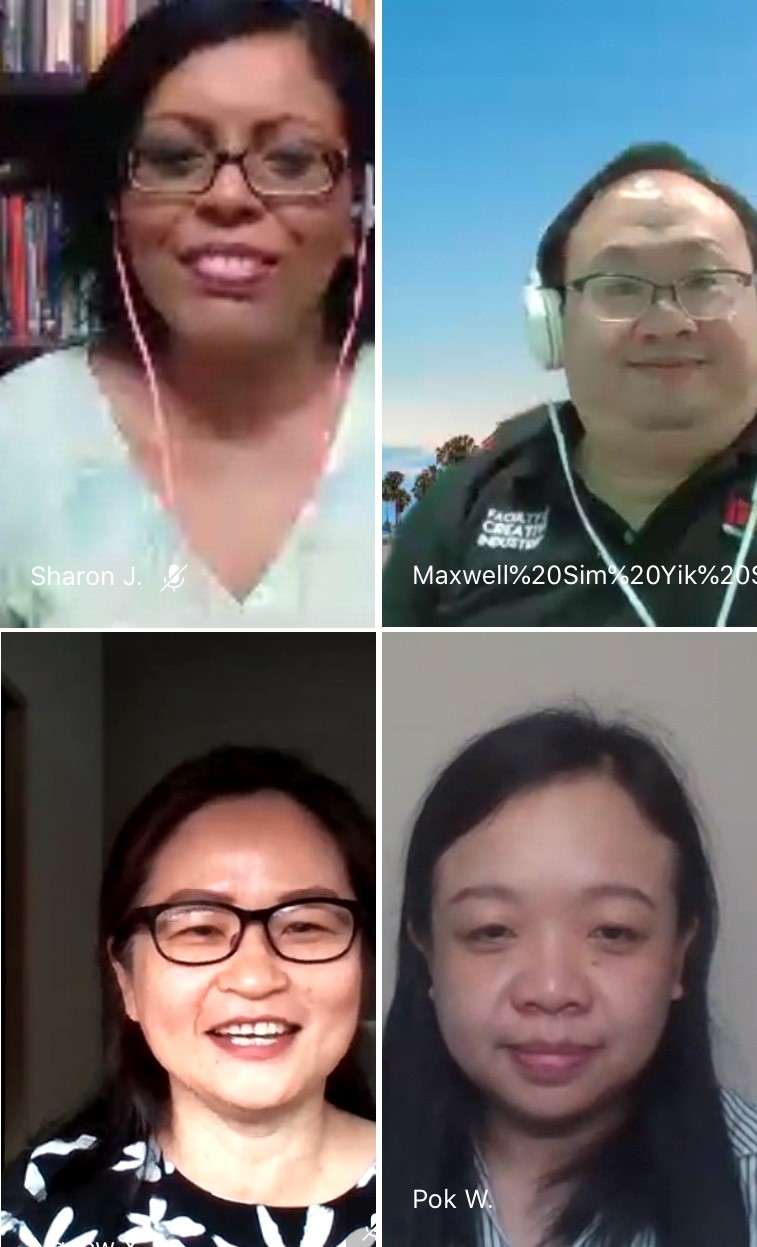
Clockwise from top left: Dr Sharon, Sim, Dr Pok and Dr Ngeow 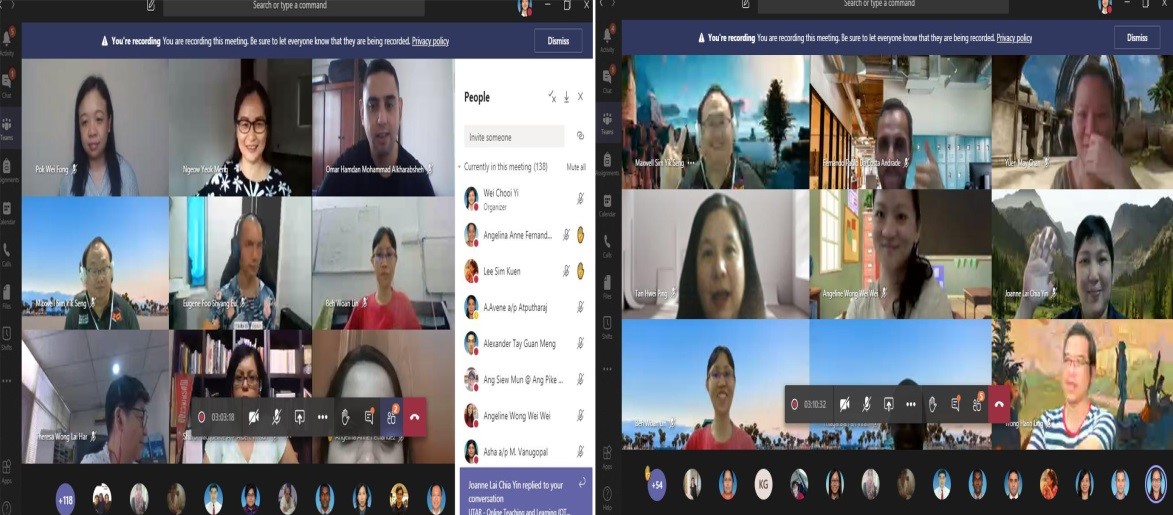
Some of the participants with speakers of session three 
Clockwise from top left: Dr Wei, Ts Dr Khor, Dr Nurul and Kristina 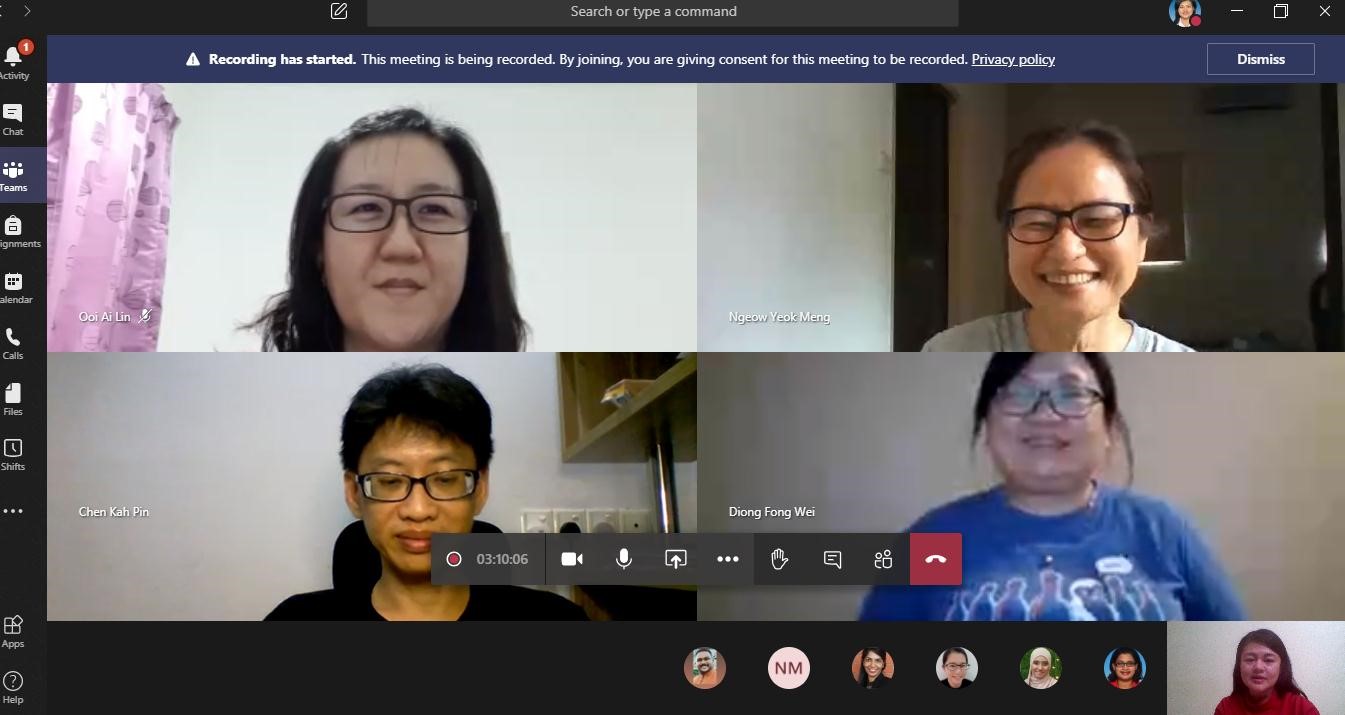
Some of the participants of session four |
| 6 | CLT Talk on “Enhancing OTL with Pen Tablet”, conducted by Mr. Eugene Foo Shyang Eu,Department of Multimedia Design and Animation, Faculty of Creative Industries, Platform: Zoom
An enlightening sharing session on pen tablet was co-organised by Curriculum Development and Innovation (CCDI) and Centre for Learning and Teaching (CLT) on 13 June 2020, via Zoom. The invited speaker was Faculty of Creative Industries Department of Multimedia Design and Animation Specialist Eugene Foo Shyang Eu. The sharing session aimed to assist academics in enhancing their online teaching experience through the use of a pen tablet. With Foo sharing his experience in using this tool in the industry for his practice for more than a decade, participants learnt about the many interesting functions of a pen tablet, regardless of their fields. Whether it was for Physics, Mathematics and even Chemistry, the sharing session pointed out that pen tablet has indeed begun to find its place in online classrooms. Crucially in these times of a global pandemic, pen tablet is understood to be able to help enhance academics’ online teaching skills, making online teaching smoother and more interesting. Foo kick-started the sharing session by defining a pen tablet, which is a digital drawing device. It usually comes with a specialised surface or pad that must be used with a paired stylus. He went on to explain the care and maintenance of a pen tablet, and highlighted participants to never use the pen tablet as a coaster for food, especially warm food. He also advised, “When storing the device, be sure to keep it supported with a laptop or something hard. Do not leave it suspended in your bag, because the device is susceptible to warping or bending under pressure. You can also clean the surface slightly using a moist kitchen towel and, if possible, avoid using detergents because we are not sure what the chemicals from the detergents would do to the pen tablet’s surface. Also, it is important to not exert unnecessary pressure or tap harshly on the surface.” He went on listing a few famous brands of pen tablets that are available in the market and gave some brief review for each brand. He also mentioned the price comparisons of the pen tablets and places where participants can purchase the pen tablets from. “Some of the requirements you should look into before buying a pen tablet is its Lines Per Inch (LPI) value. The LPI tells you how many digital lines fit into one inch of the tablet’s physical screen. Thus, the higher the LPI value, the better. As for the Report Rate Speed (RRS), it measures how many times per second the tablet sends information about the stylus position and pressure back to the computer. The higher the RRS, the smoother the lines. Most modern tablets have a report rate of 200+, which is fairly standard,” explained Foo. He added, “You also must look into its pressure sensitivity, which determines how much you can vary the width of lines you paint. This is done by applying different pressure on the tablet surface. The Active Area refers to the area that is reading your stylus activity on the physical surface. There is a border around the active area that does not read anything. Again, the higher the value, the better the pen tablet.” He also advised participants to be ready to spend above RM150 and more. He also pointed out that when shopping online for pen tablets, buyers must look at other buyers’ reviews and where the device is shipped from. Some of the tips and tricks he shared on using the pen tablet, included, to no hover the stylus and just hold it like it’s a pen. He also mentioned that participants should set a comfortable physical space and observe how one might move their hands. He further explained the use of shortcut keys and the use of paper on the surface to give the stylus more friction. Towards the end of his sharing session, Foo gave a live demonstration of using a pen tablet. The sharing session ended with an interactive Q&A session. |

Foo sharing his experience of using a pen tablet 
Foo explaining the care and maintenance of a pen tablet 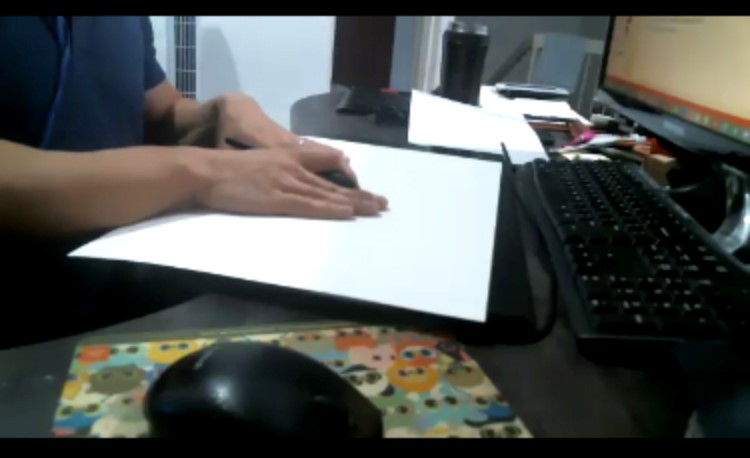
Foo demonstrating how to use a pen tablet 
A screenshot of participants at the sharing session |
| 7 | CLT Webinar on “Education during and after COVID-19: Irresistible online-education trend” by Associate Professor Zhuang Yan, School of Finance, Harbin University of Commerce, China, Platform: VooV Meeting
Centre for Learning and Teaching (CLT), in collaboration with Faculty of Business and Finance (FBF), organised a virtual talk titled “The Development of Online Education in China Universities and the Trend of Future Teaching Reform under the Epidemic” on 26 June 2020. The talk, conducted via VooV, aimed to connect the educators with the current practices in China universities and stimulate the mind of educators to experience innovation in teaching and learning from a different point of view (focusing after COVID-19), as well as to introduce the future direction of teaching reform of China universities as guidelines for Malaysia. The invited speaker was Assoc Prof Dr Zhuang Yan from School of Finance, Harbin University of Commerce, China. At the talk, she first explained the development of online education in China universities before and during the outbreak of COVID-19. She mentioned, due to the pandemic, China universities are in the process of evolving from face-to-face courses to online and hybrid courses using digital technologies to support student-centred pedagogy. “During the pandemic, 1,454 institutions of higher education in China embraced online classes. Also, about 1.03 million academic staff started their online teaching; 1.07 million free courses were made available online and 17.75 million students involved in online learning,” she said. She presented the development of massive open online course (MOOC) in China universities and shared how the Chinese government put their efforts in accelerating the MOOC development to build an innovative educational service system for learners. “The online education of China universities was initiated by our government in 2013. The six years of preparation enabled the country to respond promptly to the new crisis,” she said. She also shared some free and open online course platforms used by China universities, namely “iCourse”(爱课程); “XuetangX”(学堂在线); “Zhihuishu”(智慧树网); “Chinese MOOCS”(华文慕课); CNMOOC(好大学在线). According to her, there were two online learning platforms launched in April 2020 to provide learning resources to learners around the world. The platforms were English version of “XuetangX”(学堂在线英文版)and “iCourse International”(爱课程国际平台). Furthermore, Assoc Prof Dr Zhuang pointed out two trends of teaching reform in China universities and coping strategy of educators during this critical time. According to her, online education has become an important component of university education in China. “The COVID-19 outbreak has significantly accelerated the development of online education in China’s higher education. Modern technologies such as big data and artificial intelligence are now widely used in the education sector, which generates more comprehensive models of online education and learning resources,” she said. She added that the new direction of education reform was to cultivate talents who adapt to future social development. “The talents nurtured must satisfy future market demands, so that all resources, efforts and time invested are not wasted,” she explained. The other trend involved the development of future education; it is largely student-centred and ability-oriented. She illustrated ways to achieve student-centred and ability-oriented education and provided a comparison of online teaching and classroom teaching from a learner’s perspective. Moreover, Assoc Prof Dr Zhuang mentioned that mixed teaching mode was the necessity for an inevitable choice of higher education reform. She also introduced some smart teaching tools that were widely used in China such as Rain Classroom(雨课堂) and MosoTeach(蓝墨云班课). In order to clear up doubts for participants, Assoc Prof Dr Zhuang presented a SWOT analysis which provided the participants with an idea on how to embrace the changes that arise from the new reform. “All actions taken must have direction. It has to be based on the understanding of yourself and your judgment on the external environment,” she said. She also provided the participants with some insights by sharing strategies on how to become more resilient to the waves of reform and a crisis similar to the COVID-19 pandemic. |
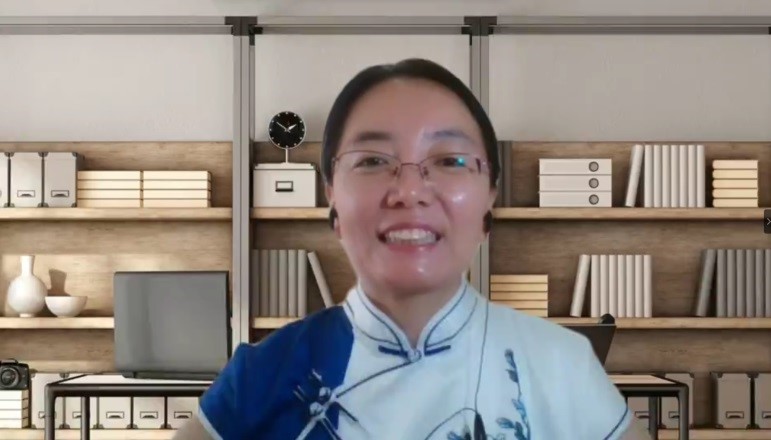
Assoc Prof Dr Zhuang explaining how the teaching reform impacts educators and learners 
The talk saw the presence of approximately 60 participants |
| 8 | CLT Discussion session on “Lively discussion on education technology by educational experts”, Platform: UTAR FB Live
A lively forum titled “Education Technology Forum: Post Covid-19” was organised by UTAR Centre for Learning and Teaching (CLT) on 24 July 2020, via Facebook Live. The invited speakers were Universiti Sains Malaysia (USM) School of Industrial Technology Prof Abd Karim Alias, Founder and CEO of AQL Learning Innovation Consultancy (AQL-LIC) Zaid Ali Alsagoff and Universiti Teknologi Petronas (UTP) Department of Computer Information Systems lecturer Ts Dr Savita Sugathan; three experts from the educational field. The forum was hosted by UTAR Faculty of Information and Communication Technology (FICT) lecturer Dr Manoranjitham Muniandy. The purpose of the forum was to provide a platform for the educators and the public— parents, teachers and students to gain insight on the latest creative and innovative teaching and learning methods, techniques and practices after the covid-19 period. Dr Mano started the forum by introducing and sharing the background of the three speakers. The first speaker was Prof Karim, a strong advocate of online learning. He is also the director of the Centre for Development of Academic Excellence in USM, editor of Elsevier journals and co-chairman of the technical committee for Malaysian Open Online Courses (MOOCs). The second speaker, Zaid Ali, is a learning innovation specialist with over 15 years of experience in tertiary and corporate education. The last speaker, Dr Savita, is a personality and team-based learning expert with 15 years of experience as an academician. Dr Savita is also a licensed practitioner of Neuro-Linguistic Practitioner and a certified Microsoft Innovative Educator. In the forum, they discussed three interesting topics, namely the challenges faced by students, educators and higher learning institutions, initiatives taken to overcome these challenges and the opportunities of moving forward. Prof Karim shared the challenges faced by students, educators and higher learning institutions, “When we talk about the challenges faced, it always abound. It is up to how we deal, react and cope. In the early covid-19 period, the challenge was both educators and students were not fully ready for the new learning and teaching environment. When learning and teaching had to shift online, everyone was surprised.” “The challenge for the educators was they had to acquire new skillsets and change their mindset. There was a transition from face-to-face learning to online learning. The learning approach in the classroom previously was teacher-centred and students were more to dependent learners, but now in the online classroom, students have to be more proactive and independent. Besides, I do feel that parents and family background bring challenges as well. In this case, I will advise teachers to be more empathetic by understanding the background of the students and change their teaching approach accordingly,” he added. Speaking of the initiatives that need to be taken to overcome the challenges, Zahid Ali said, “I have seen a lot of good initiatives by different universities. Most of the universities have conducted initiative course including webinars and online assessments to help their students and staff become better during the Covid-19 and post-covid 19 periods. This is indeed a great initiative to be taken by the institutes. At the beginning of the lockdown, the focus of the webinars and online assessments was on the tools for online learning, since all of us needed tools to teach, but now the webinars are moving towards fun learning and teaching experience.” “What Covid-19 showed us today is that lecture class can be done online and it opens up more doors to the educators and learning opportunities for the students. Universities can connect with industries by inviting CEOs or professionals around the world to share on various interesting topics,” he added. Sharing the opportunities of moving forward, Dr Savita said, “There is a shift in the education due to the covid-19 pandemic. All of us, including educators and universities, need to be able to see this as an opportunity to make changes in a positive way. Educators have to be ready to learn, unlearn and re-learn. They need to be more agile since the traditional way of teaching is no longer applicable.” “Universities also need to be more agile and flexible in adapting the changes. Universities need to manage the changes in consideration of the parents, students and educators. They can practice blended learning, both face-to-face and virtual learning which I think is a very good thing to look into to understand the needs of our students. The opportunities are wide open but universities need to figure out ways and take advantage of it to stay relevant and important in the industry. I am looking into the possibilities of having more collaboration with universities to provide opportunities for students and give more value to them,” she added. The forum saw an active interaction between the speaker and the participants. It was followed by a Q&A session before it adjourned. |

Lively forum session titled “Education Technology Forum: Post Covid-19” 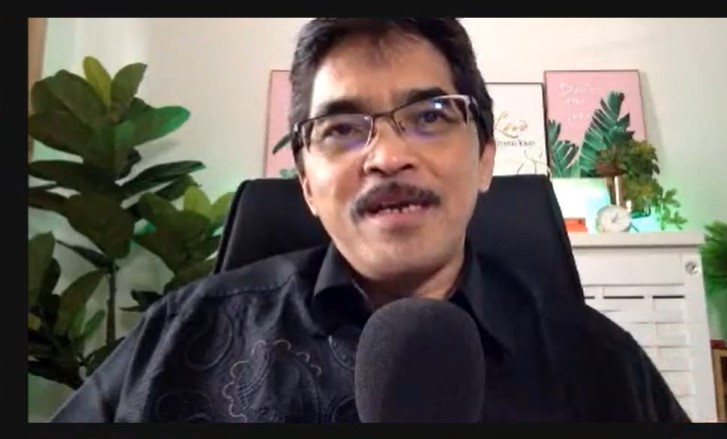
Prof Karim sharing the challenges faced by students, educators and higher learning institutions 
Zahid Ali sharing about the initiatives taken to overcome the challenges 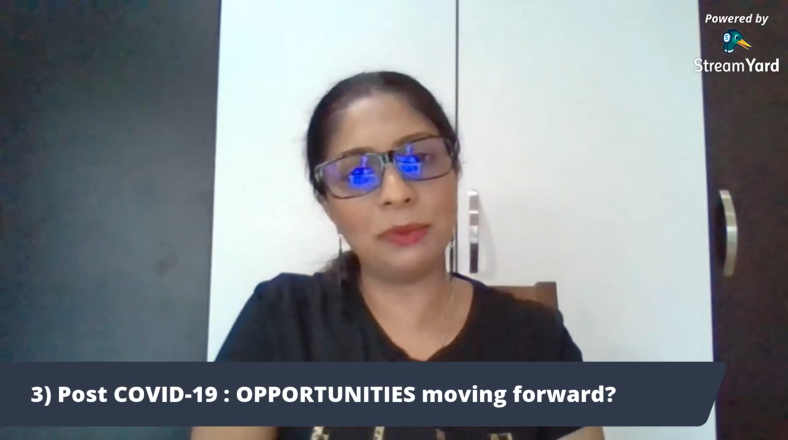
Dr Savita sharing the opportunities of moving forward |
| 9 | CLT Forum for Online Teaching and Learning (OTL) 2.0 on “UTAR holds OTL Forum 2.0 to enhance digital teaching skills”, Platform: Microsoft Team
In light of the recent pandemic, UTAR has thoroughly changed their learning system, where face-to-face teaching and examinations have been replaced with online teaching and learning (OTL) and final assessments. This transition has not only been hard on students but for lecturers as well, as they have to employ different teaching methods, in order to effectively teach and engage with their students. Thus, following the success of the first forum “OTL Forum: My Personal Journey”, another online forum titled “Online Teaching and Learning (OTL) FORUM 2.0” was co-organised by UTAR Centre for Curriculum Development and Innovation (CCDI) and Centre for Learning and Teaching (CLT). The forum was split into three sessions; the first session was held on 10 August 2020, followed by the second and third on 13 and 14 August 2020 respectively. All sessions were held via Microsoft Teams. The forum also saw a total of 200 participants across all three sessions. The forum aimed to enhance the digital skills and pedagogies of the academic staff. During the three sessions, a total of nine panellists from different faculties of both campuses shared their own experiences in OTL pertaining to e-learning pedagogy, student engagement and specific OTL tools. Speaking in the first session were Faculty of Accountancy and Management Head of MBA/MBA (Corporate Governance) Programme Dr Ng Kar Yee, Lee Kong Chian Faculty of Engineering and Science lecturer Ir Dr Teoh Hui Chieh and Centre for Foundation Studies lecturer Ting Jen Ching. The first two sessions were moderated by Faculty of Creative Industries (FCI) Deputy Head of CCDI Dr Ngeow Yeok Meng while the last session was moderated by Faculty of Arts and Social Science lecturer Assoc Prof Dr Cheah Phaik Kin. The first speaker, Dr Ng’s session focused on her experiences in engaging with adult students, as she is in charge of 62 Masters in Business Administration (MBA) students. “Adult students are harder to teach, since they are purposeful and competent in nature, so they know what they want to learn from the course and can be sometimes too direct or less open-minded. These students also have multiple responsibilities, such as busy work schedules and family commitment, which is why I am quite flexible with them in terms of time,” said Dr Ng when explaining the characteristics of the adult students. Dr Ng then explained her methods of conducting online classes with her students, in which she stated, “It can be difficult to teach and engage these adult students online as they can be very busy. So, I used several methods, such as case studies, hands-on practice and problem-solving questions. The most efficient method is using the SmartBook, which is a sort of e-textbook platform. SmartBook has so many helpful functions other than allowing my students to use the textbook they need, such as giving test questions, creating quizzes and arranging assignments.” Her students told her that the SmartBook was useful and convenient, especially since they do not need to travel a long distance to attend class. Dr Teoh, the second speaker, continued the forum by speaking about open-ended questions. She started her talk by explaining the multiple definitions of the open-ended question. “Whenever I ask my colleagues about their definition of an open-ended question, the two common answers that I would receive are ‘questions that cannot be found in the book’ and ‘questions that have no right answer’. However, there is no specific definition; it can be mostly described as questions that are designed to encourage a full and meaningful answer using the subject’s own knowledge and feelings,” said Dr Teoh. Dr Teoh then provided an example to demonstrate the difference between open-ended and close-ended questions, noting that the latter can easily be tweaked to turn into the former with a few minor changes. “Close-ended questions can be changed to open-ended questions by making several changes. For example, you can provide additional knowledge in the question to teach students or ask them their opinions and reasons for their agreement or disagreement with the question statements,” said Dr Teoh. She moved on to explain its characteristics and ended her talk by explaining the reasons as well as the challenges faced by lecturers and students in making and answering open-ended questions. The third and final speaker, Ting, began her talk titled “How to use Autodesk Sketchbook” by explaining her reasons behind using this application. She stated that Sketchbook is a free-to-use drawing application. She said, “Sketchbook is not only user-friendly, but it also helps me to produce drawings quickly compared to when I draw during a physical class. By drawing and explaining, it can help students remember the information easily and keep them focused during class.” Ting then went on to demonstrate the basic functions of Sketchbook whilst explaining how to use it. She displayed several of its functions, such as creating and duplicate layering, colouring, lassoing, and others. She also taught participants how to create simple animations using a function called “Flipbook” in the Sketchbook. “In Sketchbook, there is a function called Flipbook, which you can use to create simple animations. I find this really useful because by showing animation, some students will be able to understand the concept much more easily,” said Ting. The first session ended with a brief Q&A discussion. Following the success of the first session, the second session was conducted via Microsoft Teams on 13 August 2020 where the invited speakers were Centre for Research in Traditional Chinese Medicine Chairperson-cum-Department of Chinese Medicine Head Assoc Prof Dr Te Kian Keong, FCI lecturer Long Yew Foo and Institute of Chinese Studies of Kampar Campus Dr Chou Wen Loong. The second session started with Dr Te sharing on student feedback about the overall experience of online and traditional learning. “The Traditional Chinese Medicine (TCM) course was initiated in the year 2010. We have been conducting evaluation and receiving feedback from our students every semester ever since,” said Dr Te. He presented the evaluation results and compared the students’ feedback before the implementation of the online class with the current one. According to him, a survey was conducted to see whether students wwere ready to return to campus for physical classes or remain at home for online classes during the October 2020 trimester. “A total of 74 students provided us with survey feedback. According to the survey, 43 per cent of them are more likely to attend hybrid classes; 35 per cent of them said they are ready for physical classes and only 22 per cent of them are likely to take online classes. Overall, most of the TCM students prefer blended learning,” he said. He also shared some comments from students regarding their choice of the learning method and explained that the feedback could provide additional insights into improving the learning and teaching environment. Long, on the other hand, shared some tips on how to stay connected with students, as well as how to keep them concentrated and engaged in their learning. “You should actively engage your students and help them feel connected to their learning. You may also use videos as part of your teaching which allows students to process information faster and better,” said Long. He also mentioned that students would be much more motivated if the teaching is infused more joy and fun. “To get my students energised and excited to learn, I use an online spinner tool like Wheel Decide to decide which chapter to teach that day,” he said. He also advised to change the teaching background constantly to avoid boredom, and let the students know if the class would be ending soon in order to enhance their patience and focus. Besides, he recommended lecturers to use student response options such as Kahoot to get a better sense of the level of learning. Dr Chou, who also shared some ways to encourage student engagement in remote learning, introduced an online tool called Padlet to assist lecturers in assessing the learning of students in the classroom. “It is an online sharing tool that allows users to post text, images, documents, comments and voice recordings on a digital board,” he said, adding that lecturers and students can have a discussion simultaneously by posting their opinions using Padlet. He also provided guidelines on how to use the tool effectively to create digital support structures for students. The second session also ended with another quick Q&A session. The last session saw three speakers, namely Faculty of Arts and Social Science (FAS) lecturer Dr Joanna Tan Tjin Ai, Faculty of Science (FSc) lecturer Mohan Selvaraju and Faculty of Information and Communication Technology (FICT) lecturer Ts Wong Chee Siang, sharing their respective topic of interest. Dr Joanna Tan spoke about student engagement particularly for Year 1 Semester 1 students. She highlighted the challenges that occur when engaging with students. The challenges include connectivity; lag and webcam issues; distractions such as loss or lack of concentration and noise; non-conductive environment, and absence of human connection, which refers to students’ inability to see the lecturer or coursemates face-to-face for discussion. To overcome these issues, Dr Joanna Tan gave several suggestions. The first suggestion was to obtain a data plan that can provide a stable Internet connection for the online classes. The second suggestion involved going to a location with a strong signal to avoid disruption during the online classes. She also advised participants to be more disciplined and focused during class by putting away their phones and having better time management. She encouraged students to contact their lecturers or friends to get information using social platforms such as Microsoft Teams, WhatsApp and etcetera. Her final suggestion was to watch the recording of the videos to recall or revise the lesson taught by the lecturers. Other than that, Dr Joanna Tan also talked about the important aspects of a good online learning experience, which included interaction with coursemates, gaining feedback from the lecturers or tutors, self-motivation and discipline. Mohan, on the other hand, elaborated on a teaching process called scaffolding. He provided the definition of scaffolding in education and explained its goal which was to provide instructions just beyond what the learners can do by themselves. The lecturers or tutors could help scaffold their student to accomplish tasks they could otherwise not complete without assistance. Mohan also highlighted the necessity of scaffolding students as it encourages them to be independent and self-regulated learners through deliberate and careful instructions. Besides that, scaffolding is important to provide a continuous level of temporary support to students. “Hence, this process involves incorporating extra support and responsibility in the teaching process. Many educational experts believe that scaffolding is an essential element of effective teaching,” Mohan said and continued, “There are six types of scaffolding techniques which are modelling, bridging, contextual, schema building, text presentation and metacognitive development. Also, there are four components of scaffolding which are exploring, measuring, promoting and evaluating scaffolding.” He also said that lecturers who provide substantial support in the early stage of a new concept whether it is verbal, procedural or instructional, are employing scaffolding techniques. Lastly, Ts Wong gave some insight into the ICT setup and tools for OTL. He mentioned that in order to have an effective OTL, one should have strong Internet connectivity. With that, Wong suggested several broadbands— fibre optics (e.g. TM Unifi/Maxis Fiber) and cellular networks (3G/4G) such as Maxis, Celcom, Digi and others. He also said that network coverage is important, hence he encouraged participants to get a prepaid plan before a postpaid plan, just to analyse the network coverage. Wong also mentioned that there are several tools that need to be considered when attending an online class or meeting. The tools include webcam and a microphone which will be useful during online class or presentation. He also helpfully recommended a few webcams and microphones to use for online classes. Wong finally gave several tips to improve the Wi-Fi speed and signal to ensure better connectivity. He recommended to conduct Wi-Fi speed tests by using an app called, “Wi-Fi Analyzer” and use an external router to boost the Wi-Fi speed and signal. |
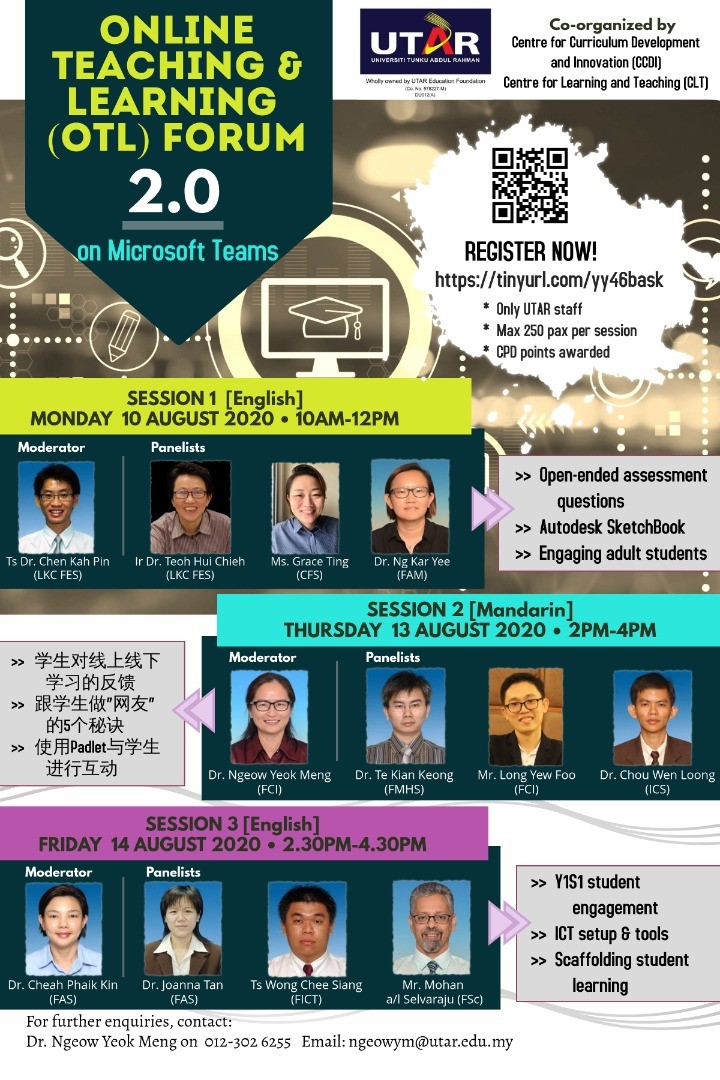
Online Teaching & Learning (OTL) Forum 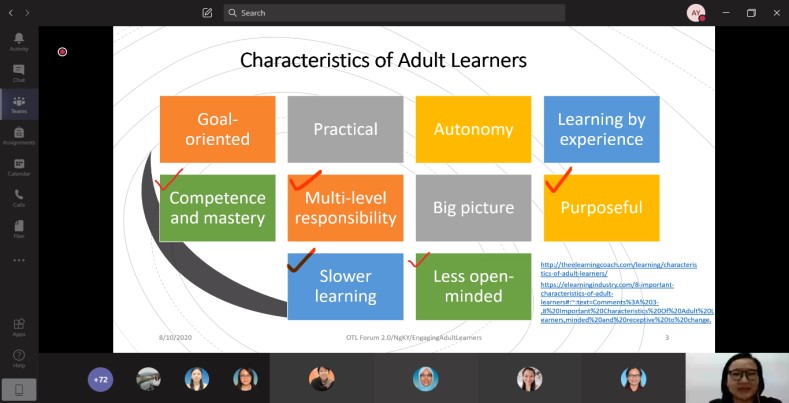
Dr Ng explaining the adult students’ characteristics 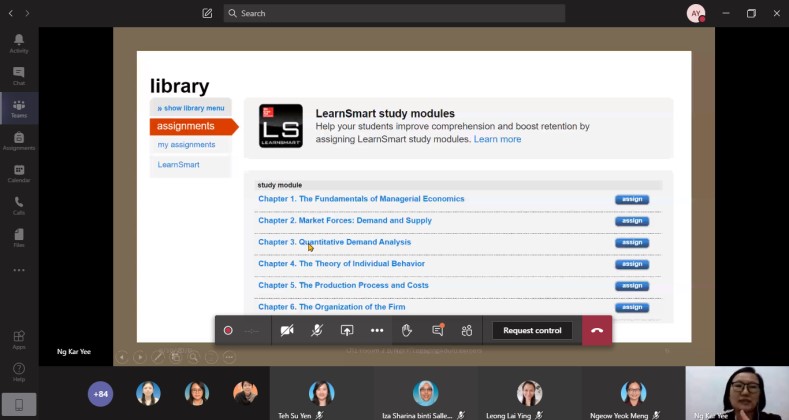
Dr Ng showing the functions of SmartBook 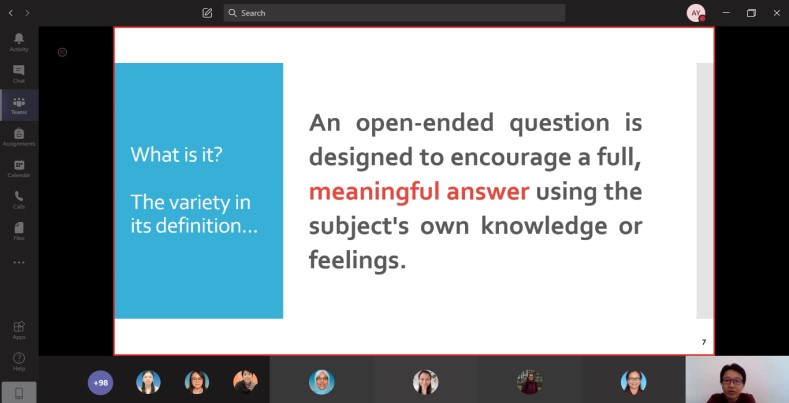
Dr Teoh defining open-ended questions 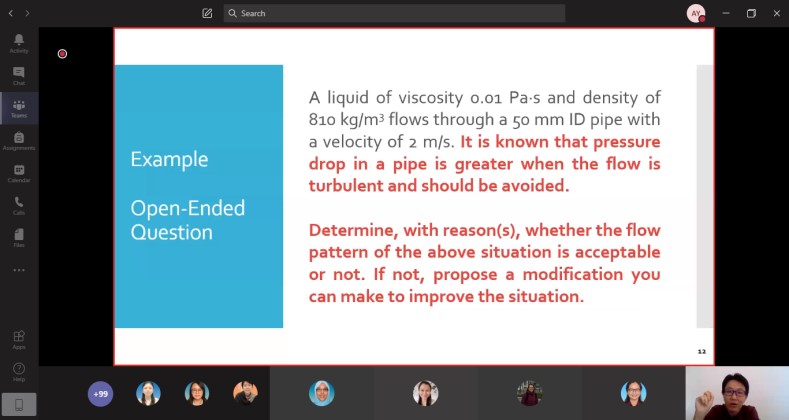
Dr Teoh showing an example of a good open-ended question 
Ting teaching the participants to use Sketchbook 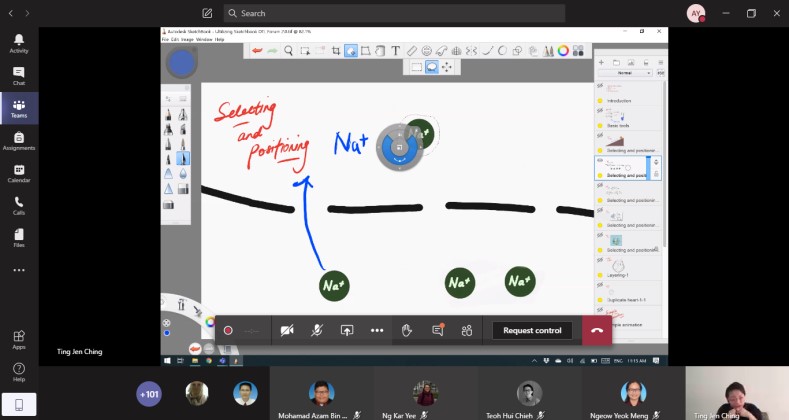
Ting demonstrating how to create animations 
From top left, clockwise: Long, Dr Ngeow, Dr Te and Dr Chou during the second session 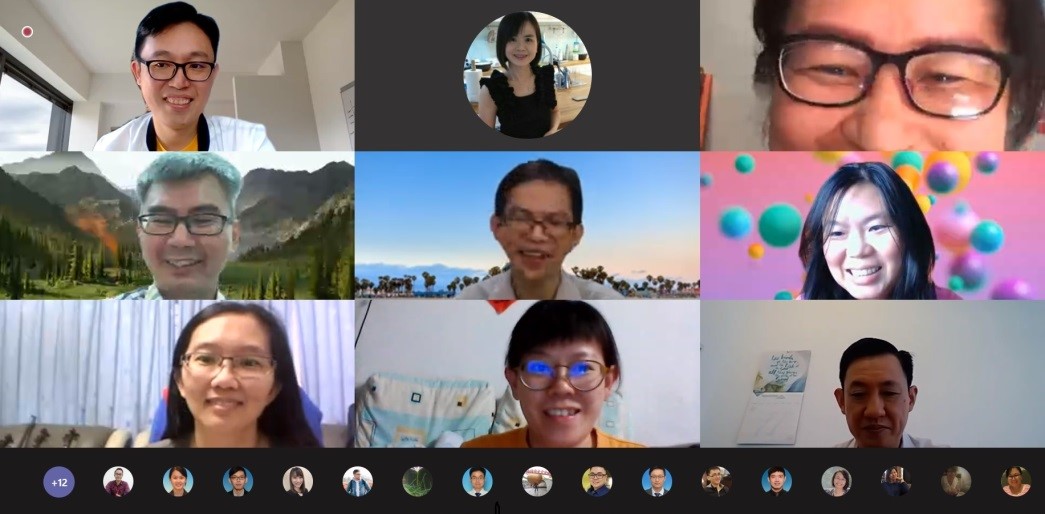
The event saw an active interaction between the participants and speaker 
Dr Joanna Tan’s sharing session in progress 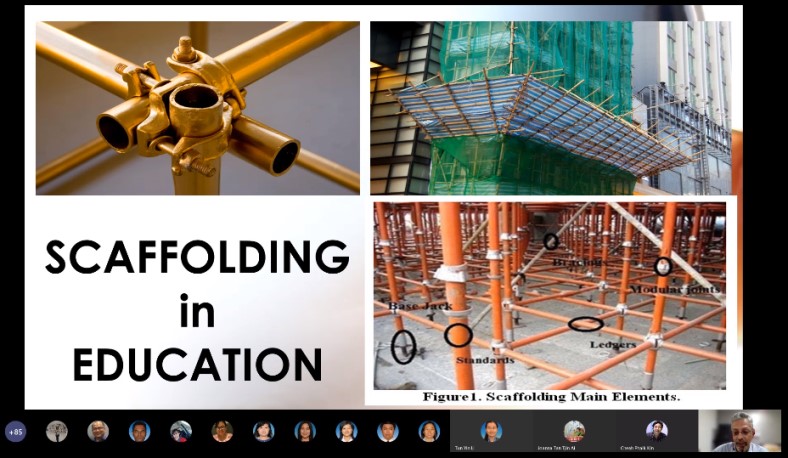
Mohan explaining the definition of scaffolding 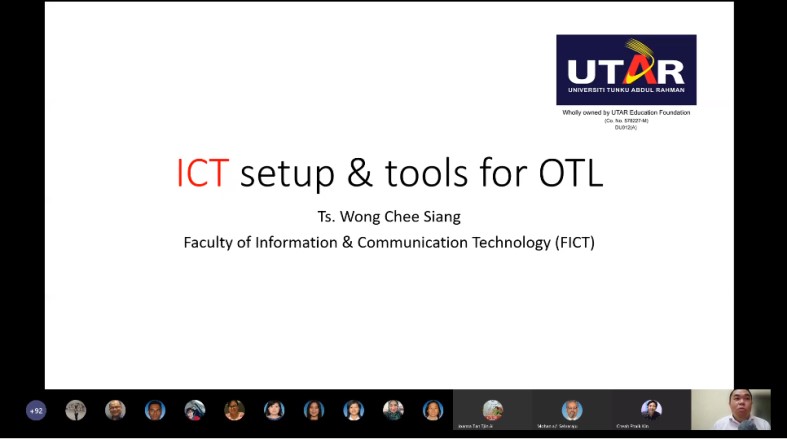
Ts Wong’s sharing session focused on ICT setup and tools for OTL The third session ended with another brief Q&A session. 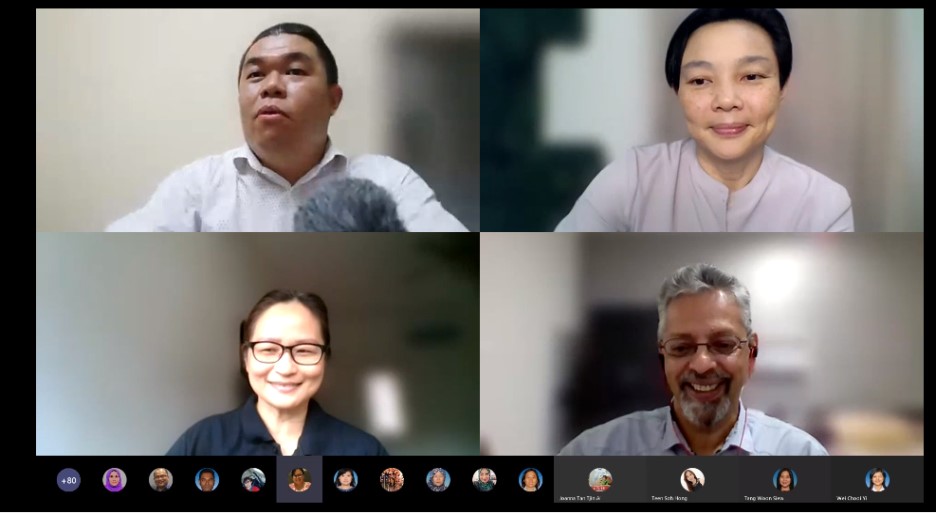

Group pictures at the end of the forum |
| 10 | 10) Participation in the UTAR First Virtual Cross-disciplinary R&D Colloquium 2020, CLT as session chair for the theme of Educational Tourism. Platform: Microsoft Team
UTAR R&D Colloquium 2020 was organised by the Institute of Postgraduate Studies and Research (IPSR) on 21 November 2020 via Microsoft Teams. The annual event was first held in May 2014. Due to the Covid-19 pandemic, the IPSR decided to organise the colloquium through a virtual platform this year. The objective of the colloquium was to serve as a platform for all researchers to share their research ideas and enhance more cross-disciplinary research collaborations among the research centres in UTAR. The initiative is in line with one of the action plans devised under Focus Area 3: Research and Development of the UTAR’s 10-year Strategic Plan 2013-2022 (i.e. Strengthening of Cross Disciplinary Research Centres). In his opening speech, UTAR Vice President for R&D and Commercialisation Prof Dr Faidz bin Abd Rahman welcomed the participants and said, “Exchanging ideas is the key to successful research. The colloquium is one of the platforms that the University creates for our researchers from various backgrounds to come together to meet, present, discuss and brainstorm on the things we can do together to help or give impact to the community which in line with the University’s vision —‘to be a global university of educational excellence with transformative societal impact’. Currently, we are in the year where we go head to head with the pandemic, and it has been a very challenging year for R&D because the R&D activities had to be stopped or paused because of the restriction in our movement. UTAR R&D Colloquium is usually organised twice per year, but unfortunately due to the pandemic, we have to cancel the physical colloquium which tentatively took place in April/May. I am thankful to IPSR staff for their hard work in organising this virtual R&D colloquium.” He was also glad that the themes for the parallel sessions were closely related to the current needs such as AIoT, healthcare, innovative technologies, edu-tourism, sustainable cities, and COVID-19 pandemic which are important and worthwhile to study. Meanwhile, he revealed, “We are currently working together with the faculties and research centres on the R&D roadmap for the next 10 years (2022 - 2032).” He wished all the participants to have a fruitful presentation and brainstorming session before ending his speech. The colloquium then commenced with its parallel sessions which were held concurrently with its respective subthemes through different channels. The first theme was ‘AIoT in Healthcare’ and it was chaired by Centre for Healthcare Science and Technology Chairperson Dr Tee Yee Kai. The session consisted of presentations by Faculty of Medicine and Health Sciences (FMHS) academic Dr Yan Naing Soe on “The Study of Management Modalities and Quality of Life of Surgical Patients in a Palliative Care Unit'', FMHS academic Dr Kang Waye Hann on “Prevalence of Hypogonadism among Type 2 Diabetic Males and its Associated Factors”, Centre for Stem Cell Research Chairperson Prof Dr Alan Ong Han Kiat on “A lot for Personalised Cancer Diagnosis, Prognosis and Drug Therapy” and Lee Kong Chian Faculty of Engineering and Science (LKC FES) academic Dr Chee Pei Song on “Polymer for Healthcare Applications”. The second theme was ‘Revolutionising Socio-Economic Development with Innovative Technologies’, chaired by Centre for Business and Management Chairperson Dr Lee Voon Hsien. Presenters for this session were Faculty of Business and Finance (FBF) academic Sai Mei Ling on “The Impact of Entrepreneurial Competencies on Firm's Sustainability Growth. A study of Malaysian Women Entrepreneurs”, LKC FES academic Dr Mohammad Babrdel Bonab on “Revolutionizing Timber Industry with Innovative Technologies”, Faculty of Information and Communication Technology (FICT) Deputy Dean Ts Dr Cheng Wai Khuen on “Personalized Recommendations in a Smart Community” and Faculty of Science (FSc) academic Dr L. Annaletchumy on “Integrative Herbs for Hypertension among Adults Living in Kinta Valley, Perak”. The third theme of the parallel session was ‘Challenges of Edu-Tourism during COVID-19 Pandemic, Strategy and Social Impact’. It was chaired by Centre for Learning and Teaching Chairperson Dr Wei Chooi Yi, and it saw presentations by Faculty of Engineering and Green Technology (FEGT) academic Ir Dr K. Chandrasekaran on “Marvel of Engineering Education”, Faculty of Creative Industries (FCI) academic Dr V. Kayatri on “Self-Regulated Learning Development in Undergraduate ESL Writing Classrooms: Teacher Feedback vs Self-Assessment”, Faculty of Accountancy and Management (FAM) academic Liew Ping Xin on “Prospects of Virtual Reality (VR) on Education Tourism”, and Centre for Immersive Technology and Creativity Chairperson Dr Aloysius Yapp and FCI academic Lim Chai Kim on “Development of a 3-Dimensional (3D) Virtual Guided Walkthrough (VGW)”. ‘Sustainable Cities and Communities: Towards Energy and Resource Efficiency’ was the theme for the fourth session. It was chaired by Centre for Sustainable Architecture Chairperson Dr Lim Poh Im. The presenters included Timbalan Pengarah, Bahagian Penyelidikan & Pembangunan, PLANMalaysia TPr Dr Chee Ping Ngang on “Implementation of the SDGs in Malaysian Spatial Planning Initiatives”, LKC FES academic Loo Shi Han on “Energy Efficiency and Design of Buildings: A Review of Existing Policies and Regulations in Malaysia”, Centre for Sustainable Mobility Technologies Chairperson Assoc Prof Ts Dr Bernard Saw Lip Huat on “Shared Space in Street Design” and Ir Dr K. Chandrasekaran on “Power Quality Administration for Smart Grid Network”. The last theme for the parallel session was “COVID-19 Pandemic: Impact of COVID-19 on Health and Healthcare Delivery”. It was chaired by Tun Tan Cheng Lock Centre for Social and Policy Studies Chairperson Assoc Prof Dr Chin Yee Mun. The topics presented included “The Impact of COVID-19 on Health and Healthcare Delivery” by former UTAR academic Dr Lee Kai Wei, “Impacts of COVID-19 on the Chinese Community in Malaysia” by FCI academic Kenneth Lee Tze Wui, “The Impact of COVID-19 on E-Commerce Ecosystems in Malaysia” by FAM Deputy Dean Dr Hen Kai Wah and “Individual Factors Affect University Students' Online Learning Passion” by FCI academic Dr Soon Thean Bee. The sessions were then followed by a multi-disciplinary research proposal presentation. It was presented by all the chairs of the five sessions on their respective sub themes. The curtains were finally drawn after the closing remark by IPSR Director Assoc Prof Dr Yong Thian Khok. Dr Yong expressed his gratitude to all the chairs, presenters and participants for their support and participation. “I am glad to see that there are more than 180 participants in this year's colloquium despite going virtual. I think this is a very good start for this kind of online discussion. You all may continue to utilise this kind of technology to conduct meetings and further discussion. With merely 2 hours, each team was able to come out with good ideas, and the most important thing next is to come out with an action plan, so that all these ideas can be gathered to form a detailed proposal to look for potential funding applications. Besides that, researchers may look for IPSR and DCinterNet on matters relating to local and international collaboration arrangements. The teams who are interested in UTAR Strategic Research Funding Scheme (UTARSRF) are encouraged to submit their proposal to IPSR. We are looking forward to seeing your proposal,” he concluded. |
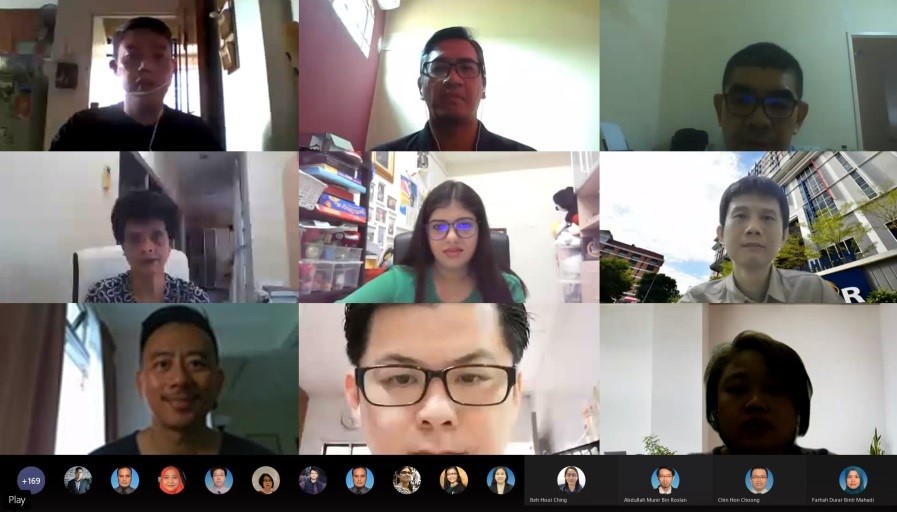
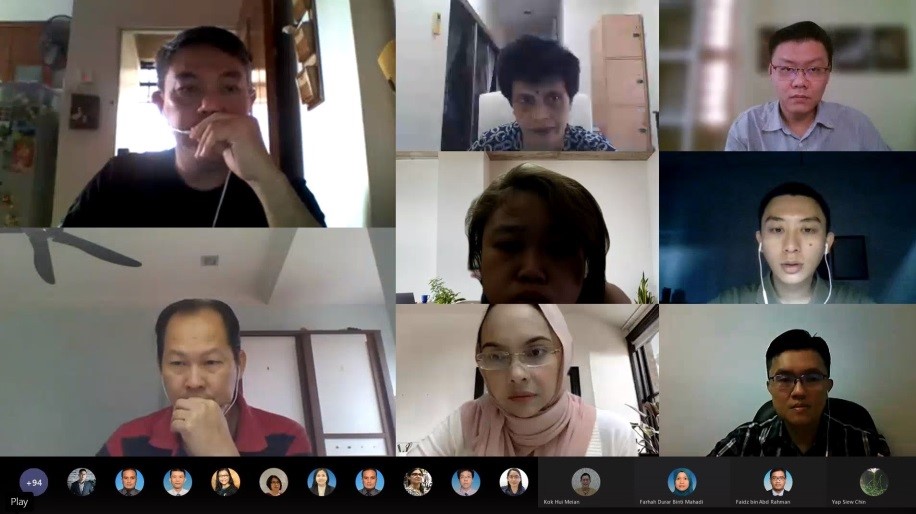
Group photo of some participants 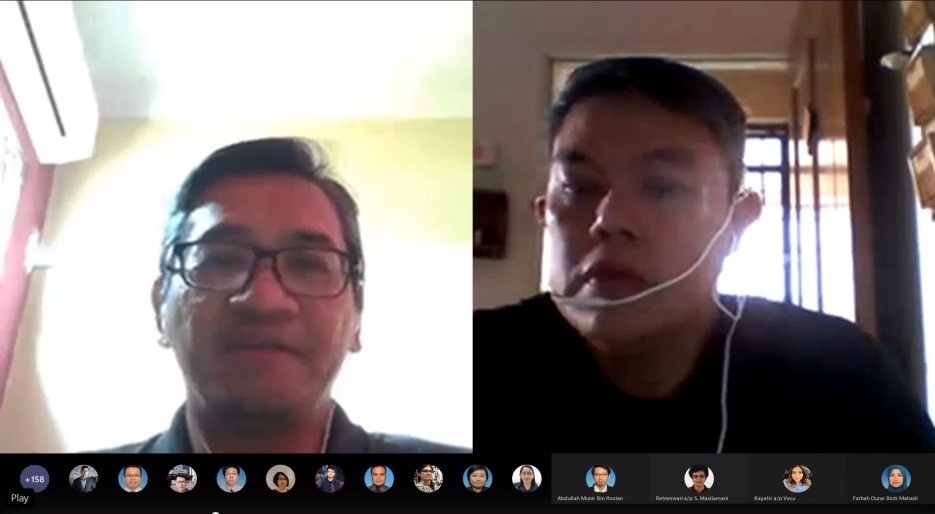
Prof Faidz (left) and Dr Aloysius Yapp (right) welcoming the participants 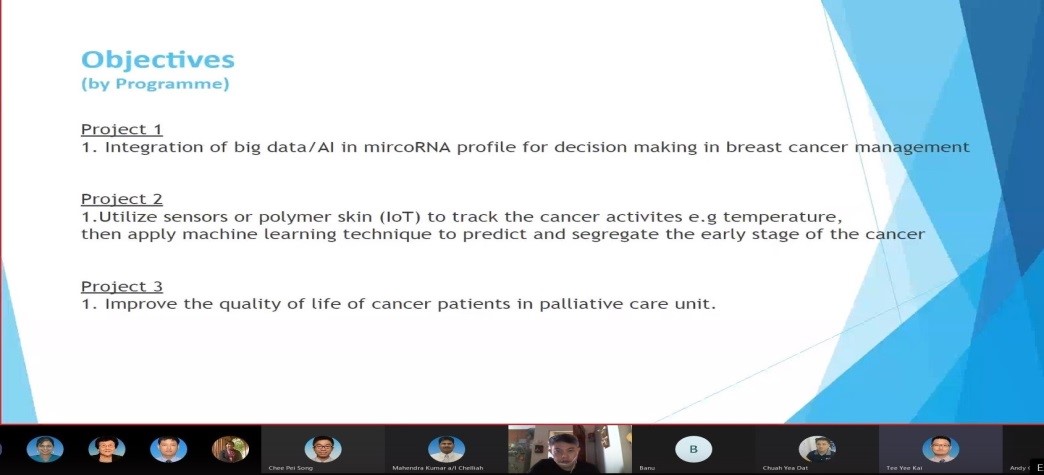

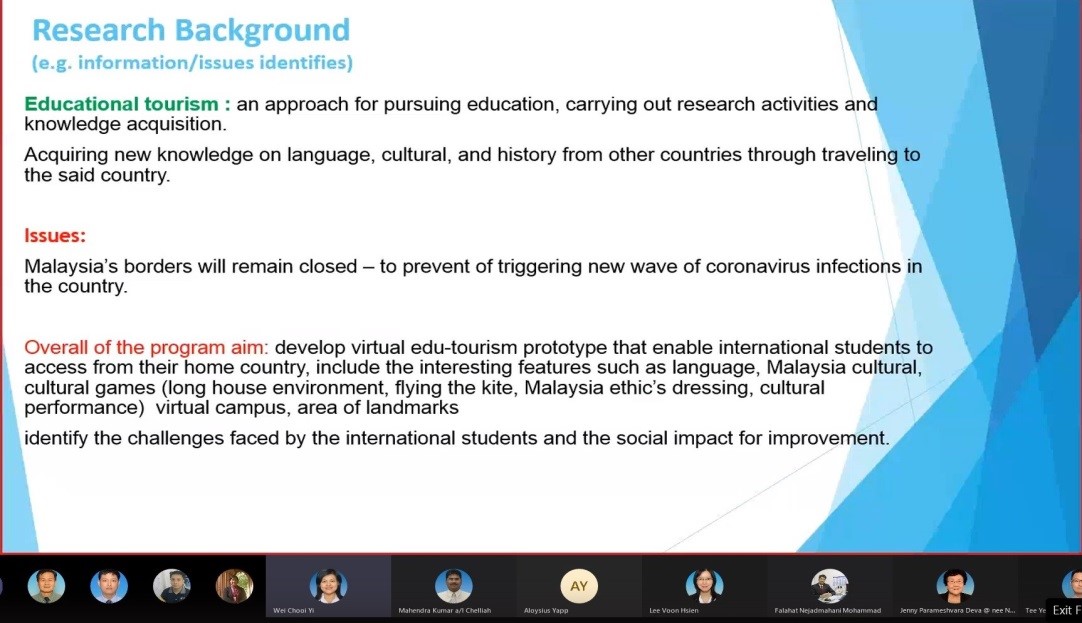
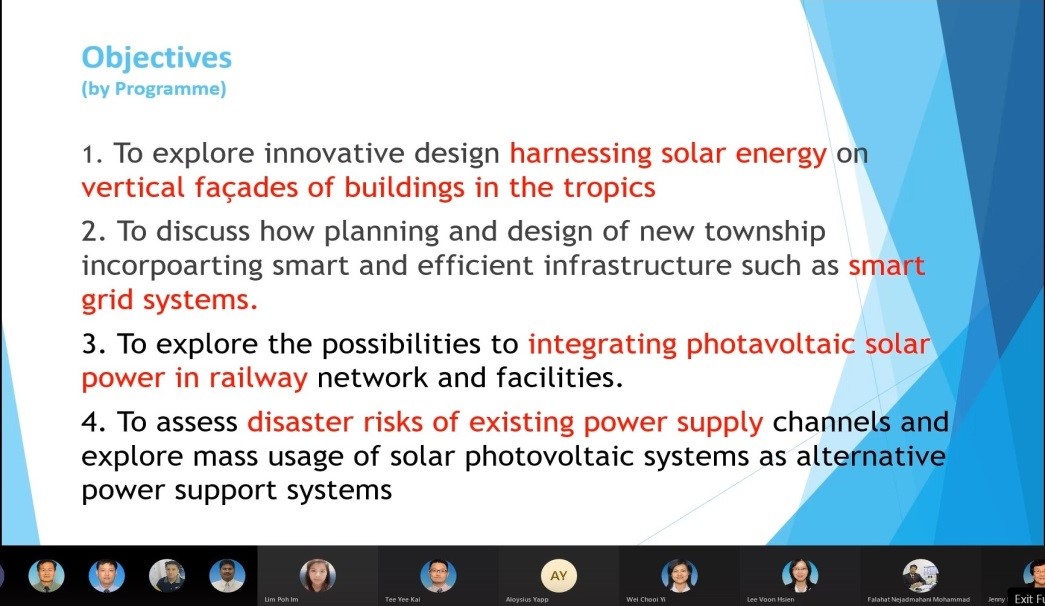

Dr Tee, Dr Lee, Dr Wei, Dr Lim and Dr Chin (from up to down) presenting their team’s discussion 
Dr Yong encouraging researchers to submit their proposal to apply for UTARSRF |
| 11 | CLT Webinar on “Challenges of Teaching Online in the Post-Pandemic Era”, Platform: Zoom
With higher learning institutions shut across the world, millions of students had to adapt to new types of learning. Education has changed dramatically, with the distinctive rise of e-learning, whereby teaching is undertaken remotely and on digital platforms. In line with that, UTAR Centre for Learning and Teaching (CLT) successfully organised a webinar titled “Challenges of Teaching Online in the Post-Pandemic Era” on 12 December 2020 via ZOOM. Joined by more than 150 participants, the webinar was divided into two talks and they were moderated by Faculty of Arts and Social Science lecturer Surindar Kaur a/p Gurmukh Singh. The first talk of the webinar titled “Online Teaching: Some Questions and Issues” was delivered by Prof Dr Moses Samuel from the School of Education of Taylor’s University. Meanwhile, the second talk, titled “Online Collaboration for Student Engagement: Pedagogies and Tools” was delivered by Assoc Prof Dr Dorothy DeWitt from the Faculty of Education of University of Malaya. Explaining the meaning of online teaching and its challenges to the participants who were mostly academics and lecturers, Prof Moses elucidated, “The Covid-19 pandemic has been a game-changer in the education sector. There are no doubt some positives in the extent to which online teaching has been implemented. But the crisis has been a stress-test. It has foregrounded critical challenges for online teaching; and technology is not necessarily the panacea that it was touted to be.” His talk also emphasised on the roles of technology in crisis management and some of the emergent terms such as technology as a response to crisis and technology as a considered response to facilitate learning. He added, “There are challenges to overcome in online teaching and learning. Among the main challenges are access to education and quality of education. Some students without reliable internet access and technology struggle to participate in digital learning. Obviously, there are inequalities between rural and urban areas. However, for those who do have access to the right technology, certainly learning online can be more effective in a number of ways. In terms of quality education, there are also some impacts such as the rise in teacher-centred pedagogies where students have a lack of familiarity with interactive resources and eventually resulted in a new teacher centeredness. In addition to that the learners are not always visual, less embodied interaction, loss of affordances from reduced modalities.” Prof Moses also explained some other shifts that have taken place in quality of teaching such as learning attrition, assessment issues and other issues such as the balance between online and in-class instruction, electronic resources, library support and technology support. The following session was a talk by Dr Dorothy which covered various topics, namely online collaboration, student engagement, online pedagogies, principles of learning intellectual skills, and resources for online collaborative learning. She kick-started her talk by sharing a fact as reported in Asia Sentinel and said, “Education experts are quickly jumping onto the online teaching model that has sprung up during the Covid-19 crisis. Such ventures are not new and very few have been very successful. Very few Malaysian academics are enthusiastic about online teaching. One lecturer said that although students are tech-savvy, multi-tasking and prefer lecture recordings, they also prefer the peer environment so they can socialise and network. Online teaching can’t replace that.” Dr Dorothy added, “Collaborative learning is a process of teaching and learning whereby a group of learners working together towards common goals through problem solving, task accomplishment or knowledge creation. It also can be explained as the acquisition of knowledge, skills and attitudes which resulted from group interactions.” The talk then explained on different types of student engagement, namely behavioural engagement, emotional engagement and cognitive engagement. She clarified, “Behavioural engagement means attendance and involvement, absence of disruptive or negative behaviour; emotional engagement means interest, enjoyment or a sense of belonging; last but not the least cognitive engagement is defined as the extent to which students’ are willing and able to take on the learning task at hand. This includes the amount of effort students are willing to invest in working on the task and how long they persist.” The talk also focused on online pedagogies in which Dr Dorothy emphasised on the importance of interaction between the teachers and learners in order to ensure presence. She explained, “The teachers could grab the attention of the learners via two methods, namely cognitive presence and social presence. The attention of the learners can be kept by adding video lectures, slide presentations and video viewing while conducting lecture and tutorial classes. Meanwhile, in order to maintain the social presence the lecturers could engage their students in the virtual classroom by conducting formative assessments such as virtual quiz, padlet or mindmapping activities online. Also present during the webinar was Chairperson of CLT Dr Wei Chooi Yi, UTAR lecturers and staff. The talk ended with an interactive Q&A session with both speakers. A virtual group photo was taken at the end in order to mark the success of the webinar. |
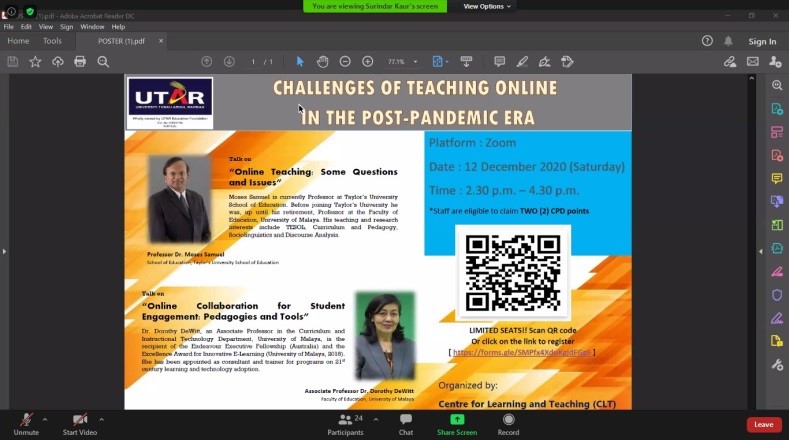
The speakers of the webinar were Prof Moses (top) and Dr Dorothy (below) 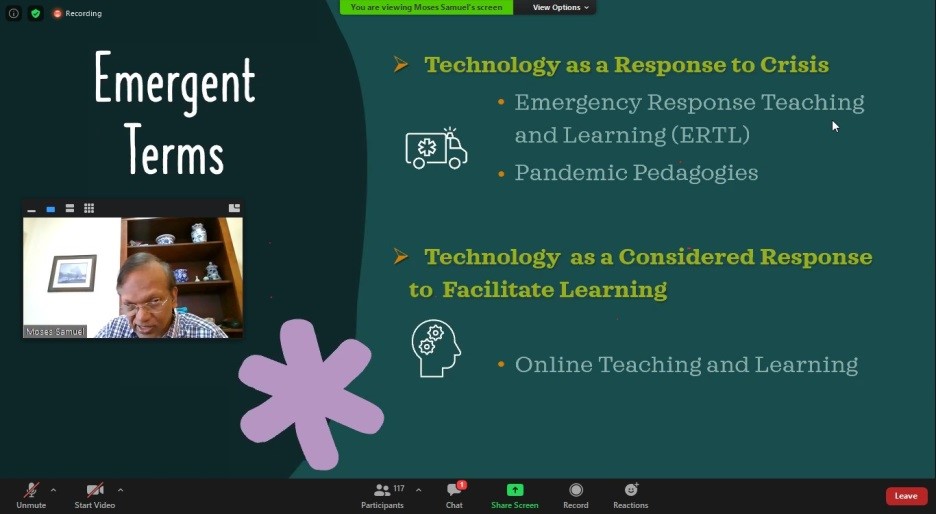
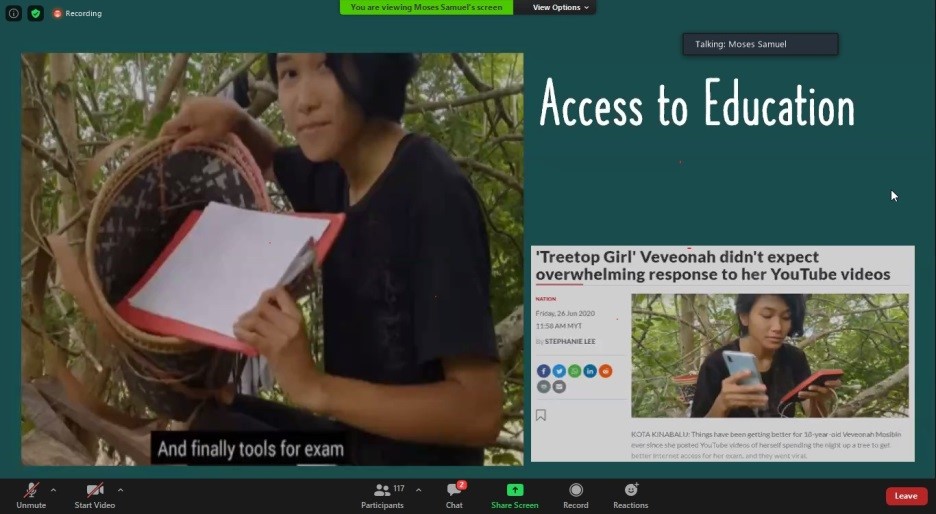
Prof Moses explaining the emergent terms about technology and its accessibility to education 


Dr Dorothy explaining the process of online learning and its connection to education before and after the pandemic 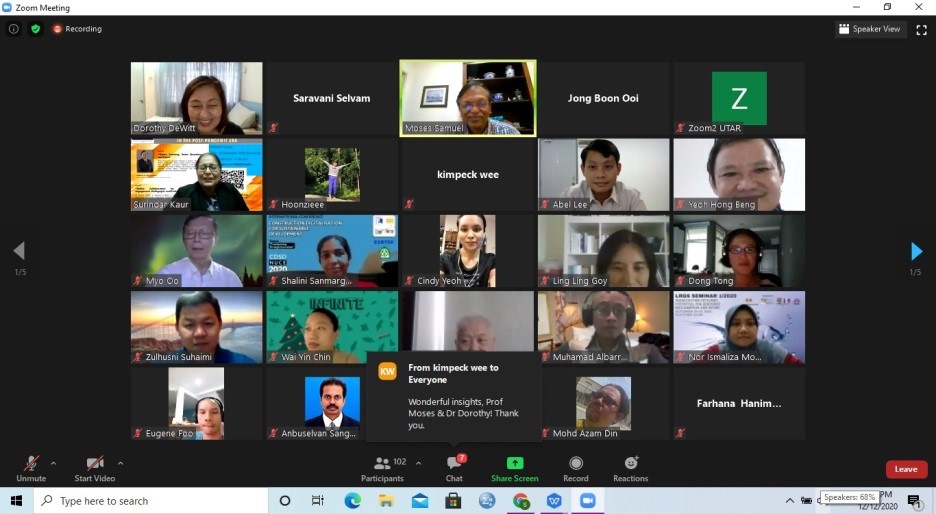

Group photo to mark the end of the webinar |
| 12 | CLT organising “ 3 Minutes Video Competition: Innovative Young Educator” to promote STEM through virtual competition
Kuala Lumpur Engineering Science Fair (KLESF) 2020, which was held online from 12 December 2020 to 20 December 2020, offered a number of competitions and quizzes for students to encourage them to stay connected with science, technology, engineering and mathematics (STEM) as well as to show off their projects and problem-solving skills. The competitions saw an active participation of both local and international students. Aside from providing a platform for students to showcase their work and share their projects and findings to peers, family, teachers, community and judges, KLESF also offered a chance for them to win attractive prizes that were set for each competition. All the student participants were also awarded an e-Certificate of participation. The winners for the competitions were announced during the award ceremony on 20 December 2020. The winners for each competition were as follows: Drawing Competition in the workshop “HEART: Anatomy × Art” |
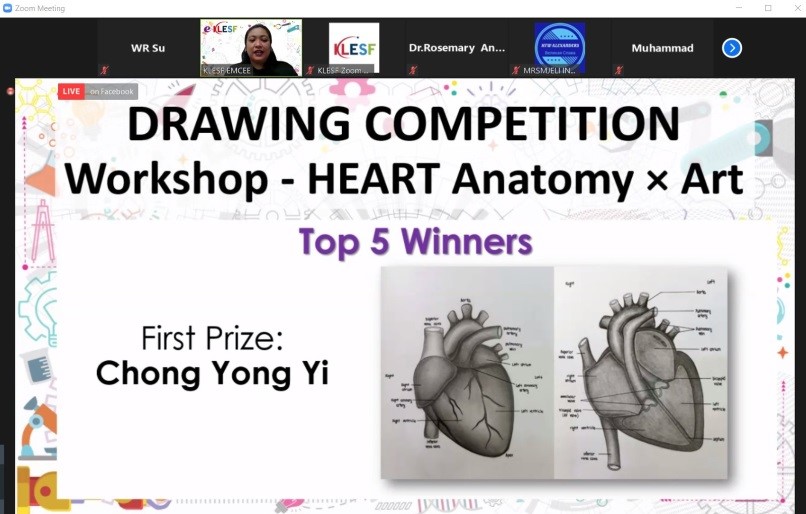
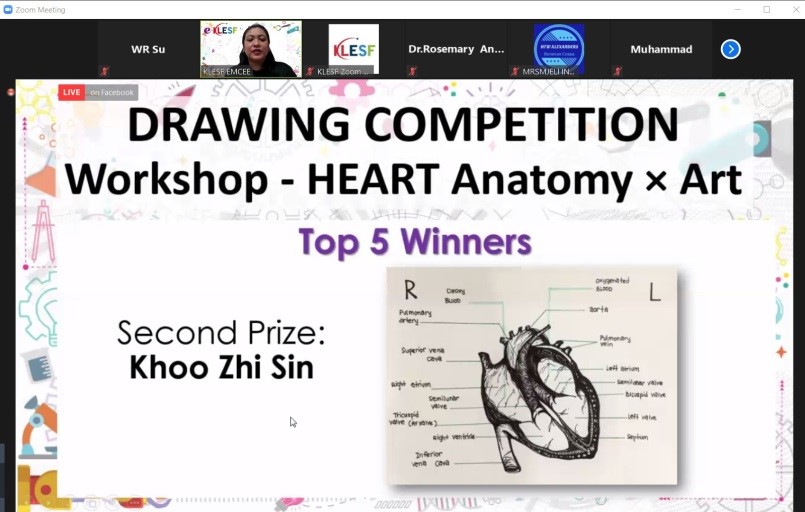

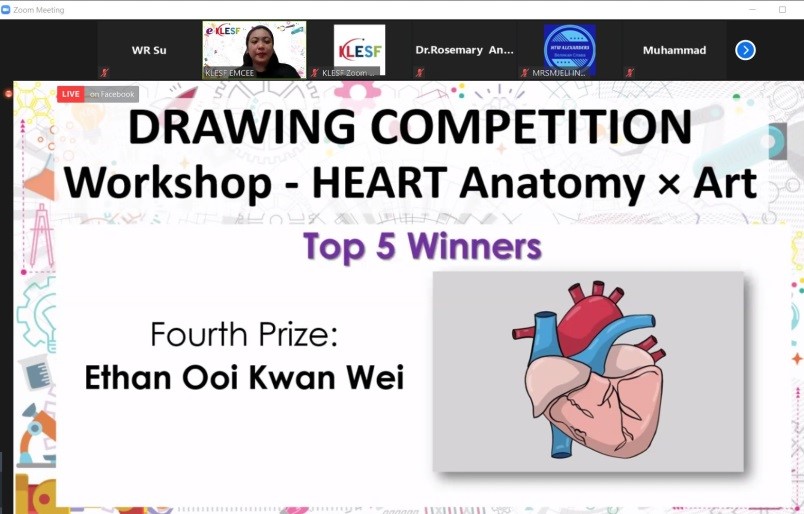


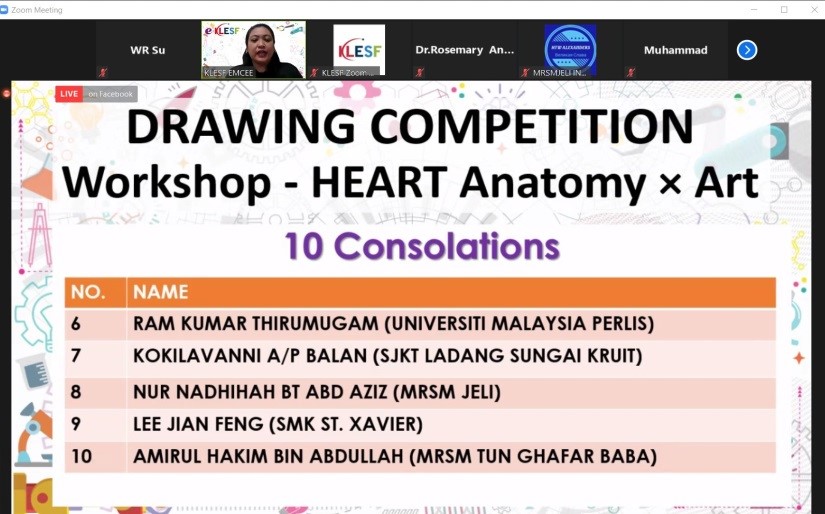
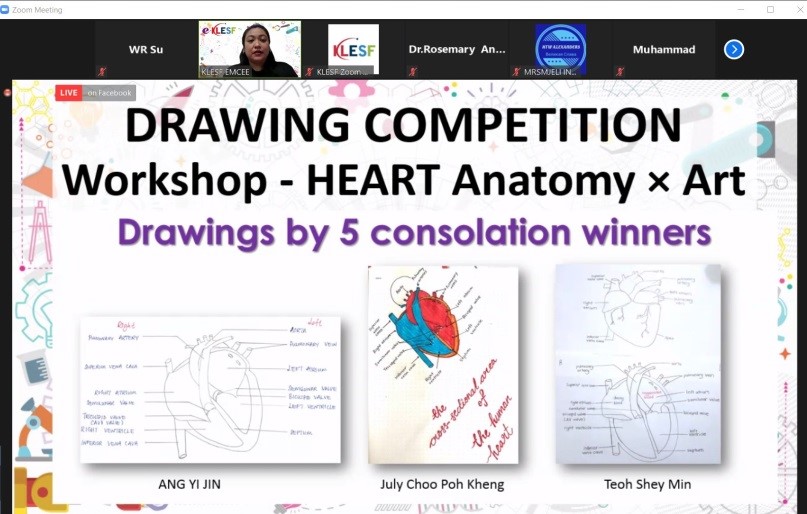
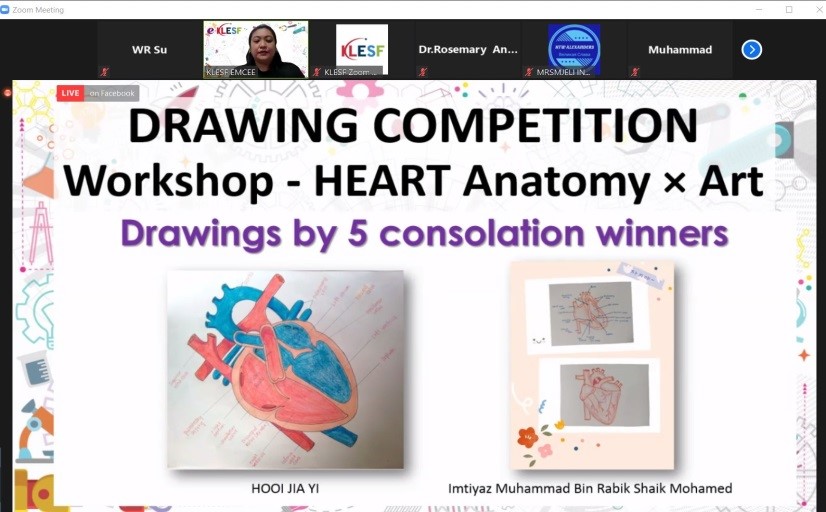
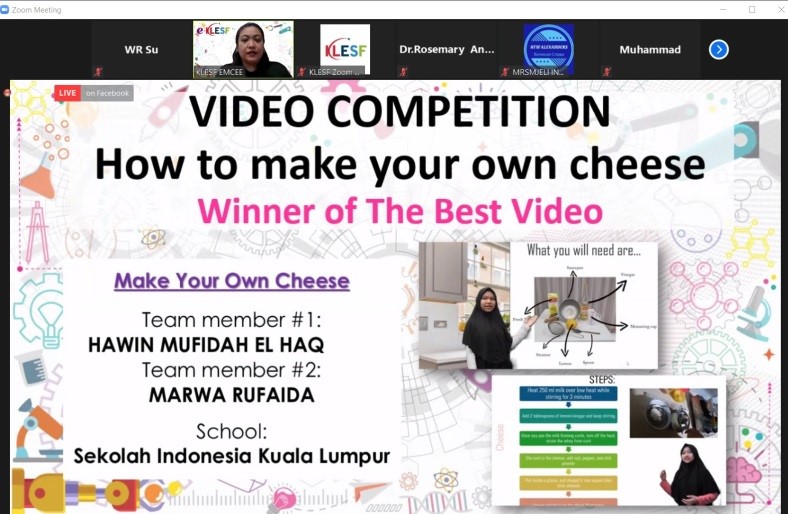
Cheese Making Video Competition in Webinar "How to make your own cheese" 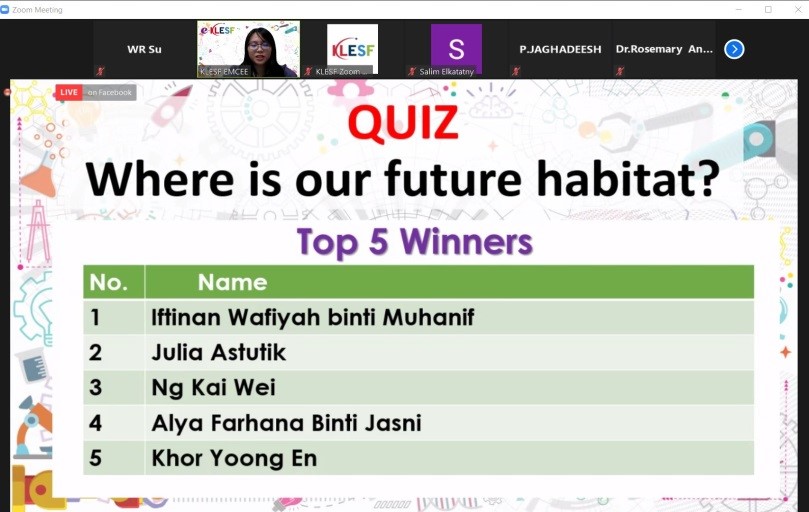
Quiz in Webinar “Where is our future habitat?” 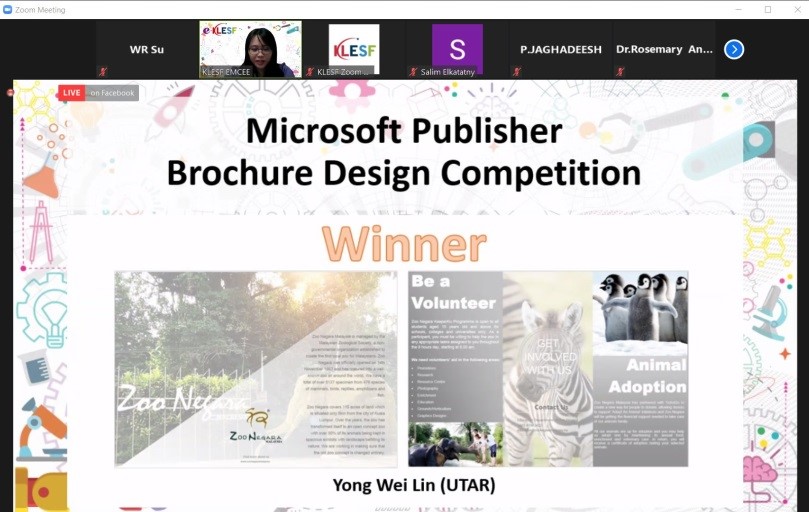
Brochure Design Competition in Workshop “Creating Professional Brochures Using Microsoft Publisher in a Few Clicks” 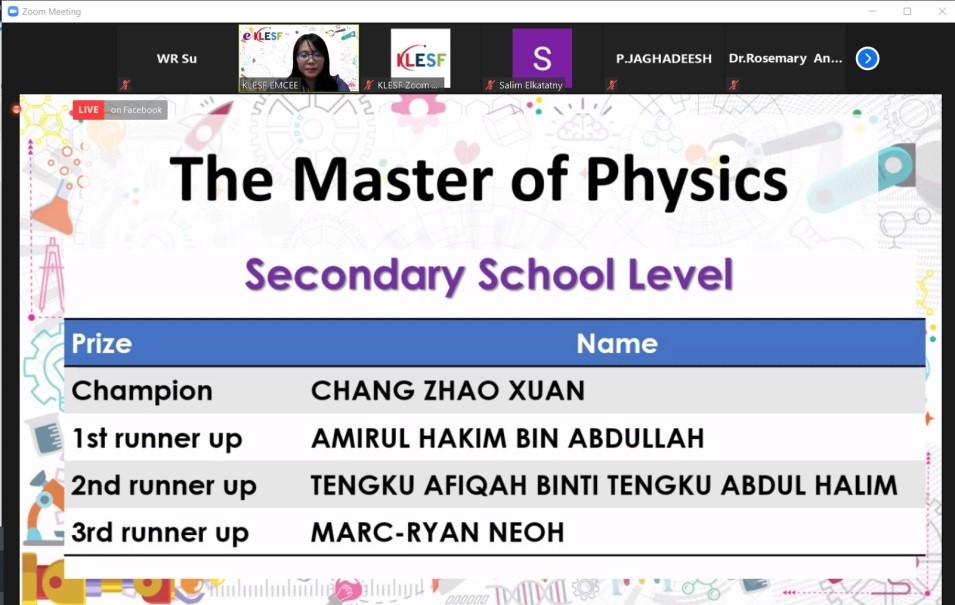
The Master of Physics 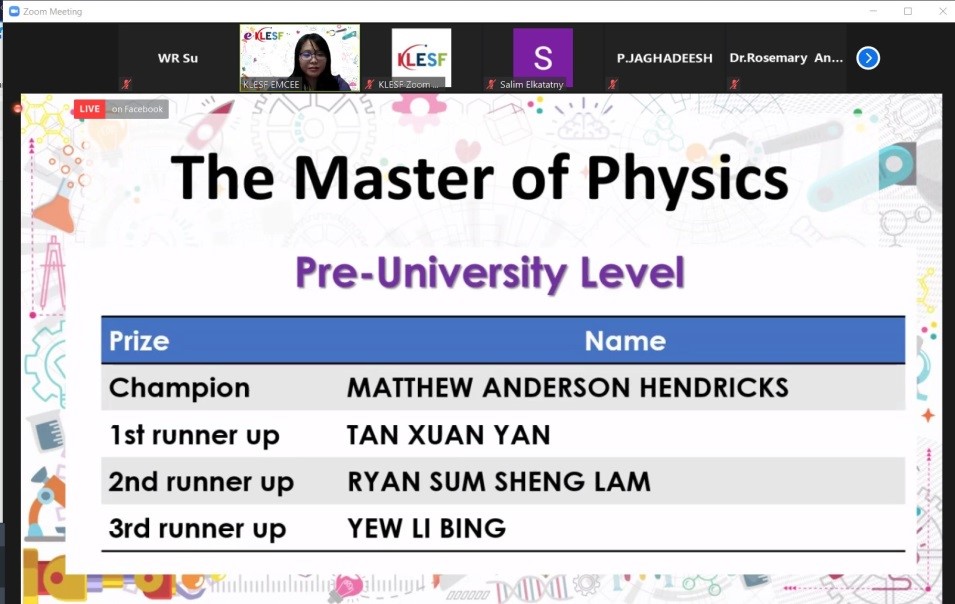
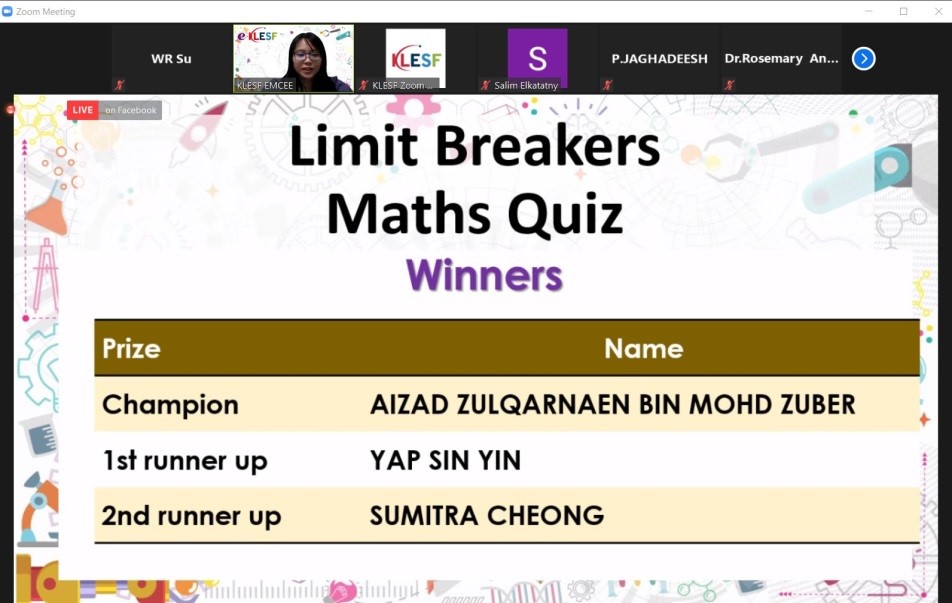
Mathematics Online Quiz Competition: Limit Breakers 
3-Minute Video (3MV) Competition on “Innovative Young Educator”
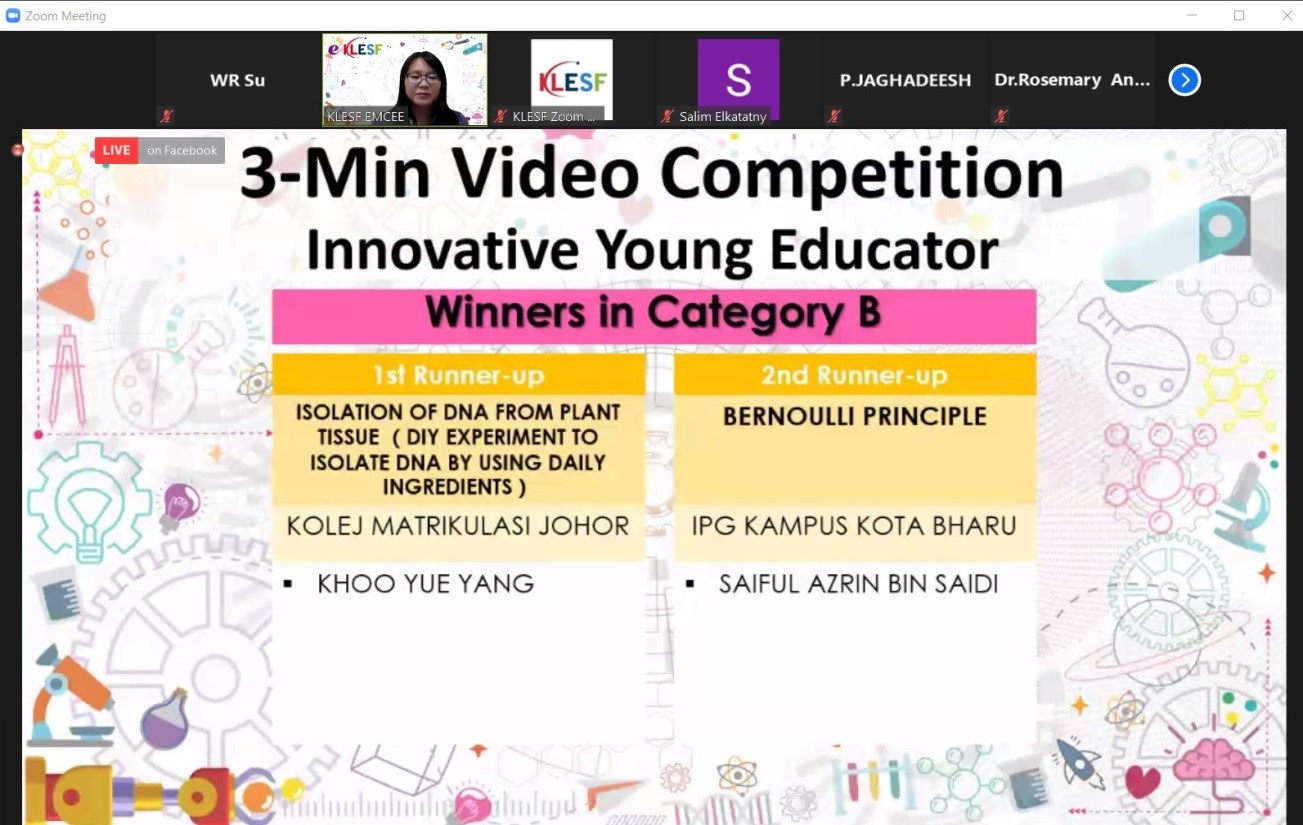
Category B: 18 - 19 years old 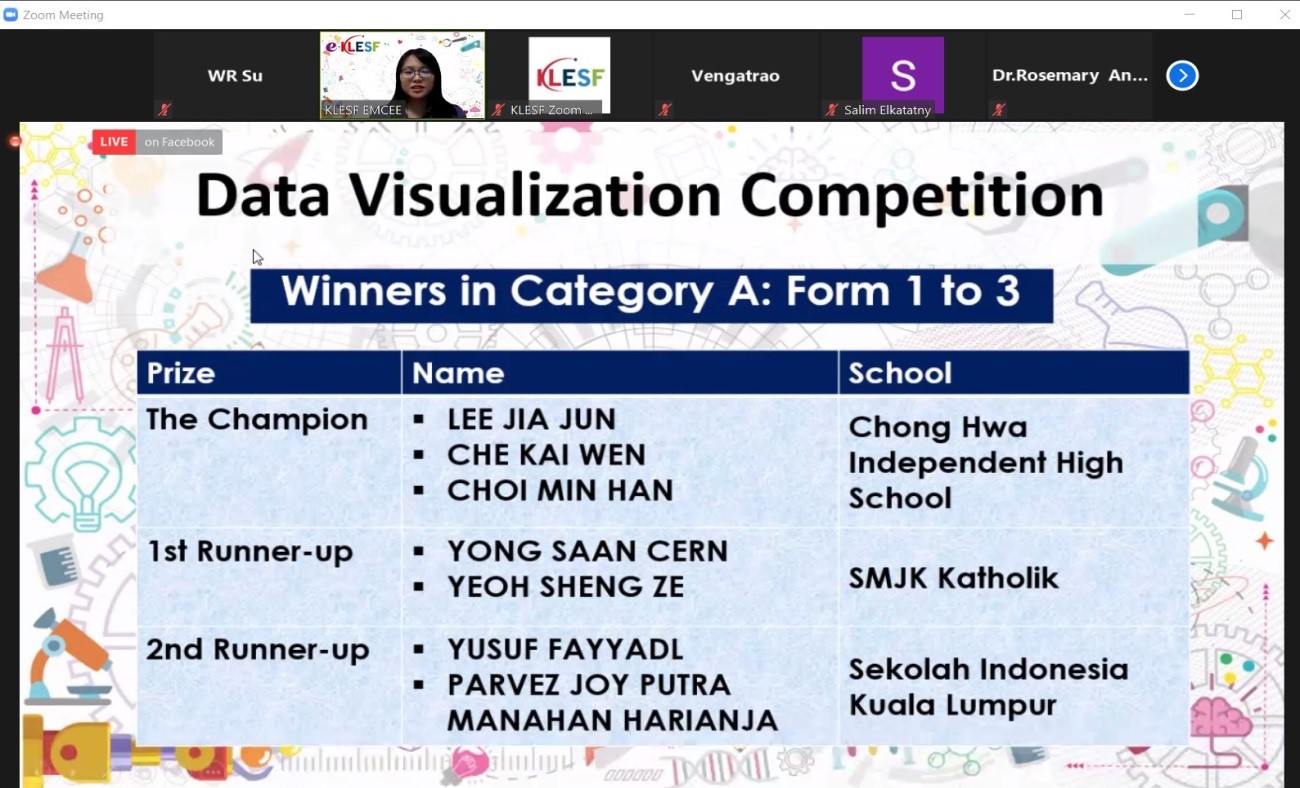

Data Visualization Competition 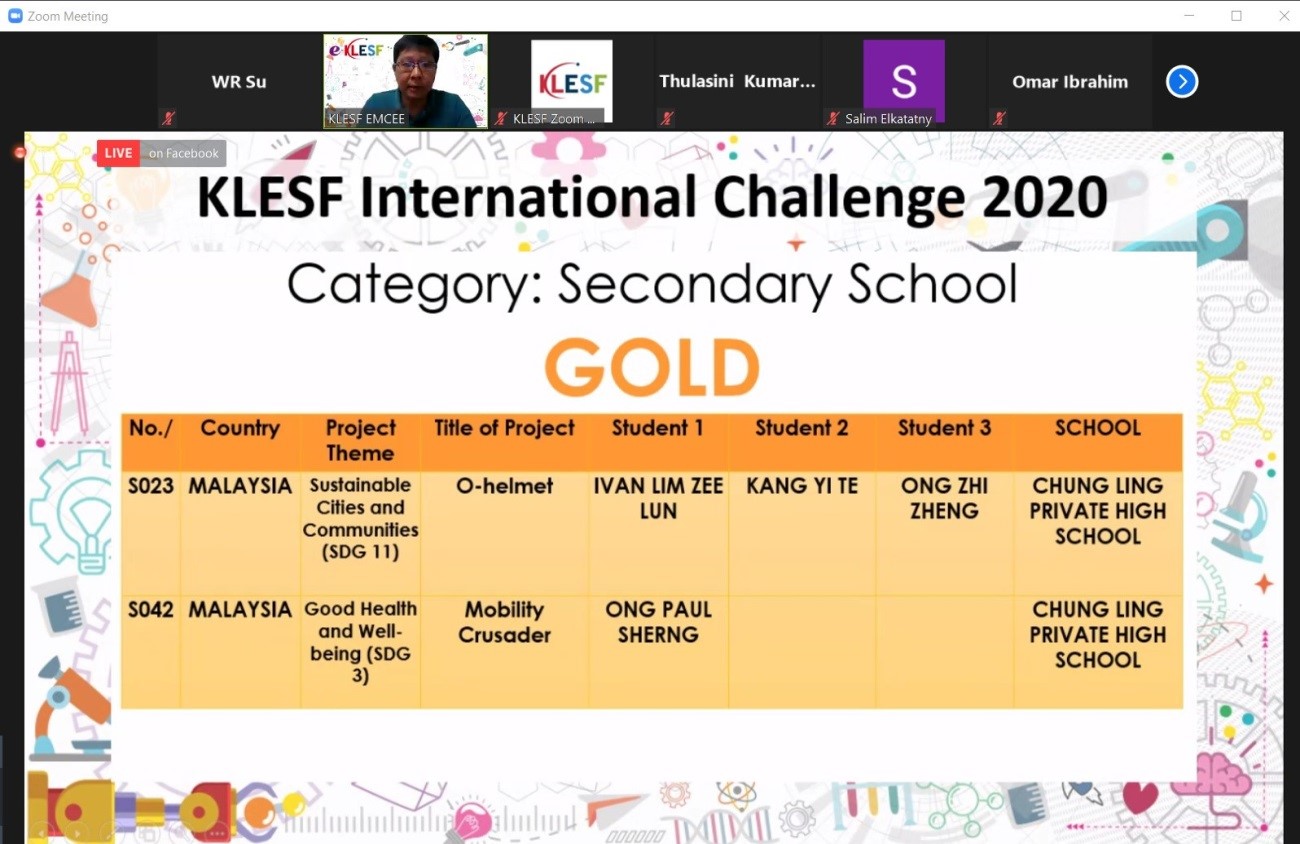 KLESF International Challenge 2020 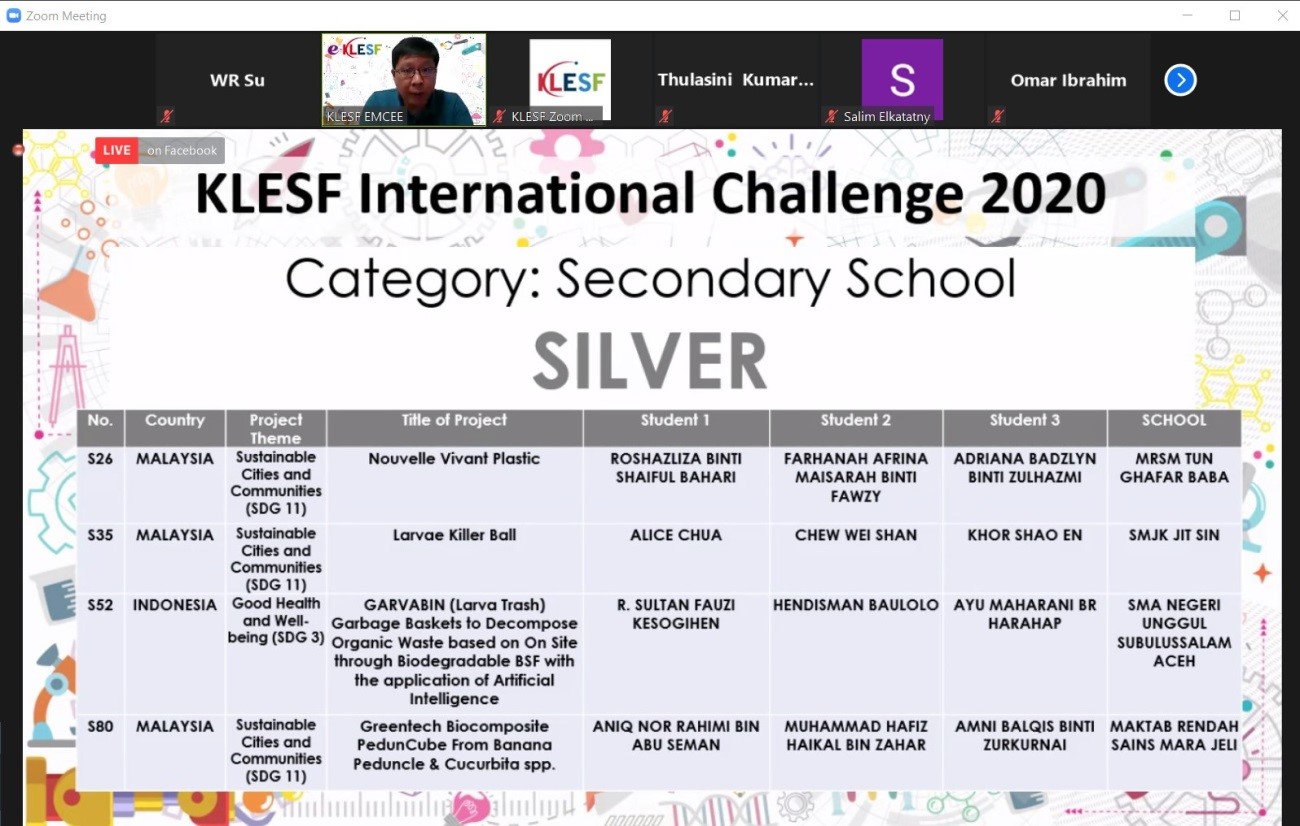
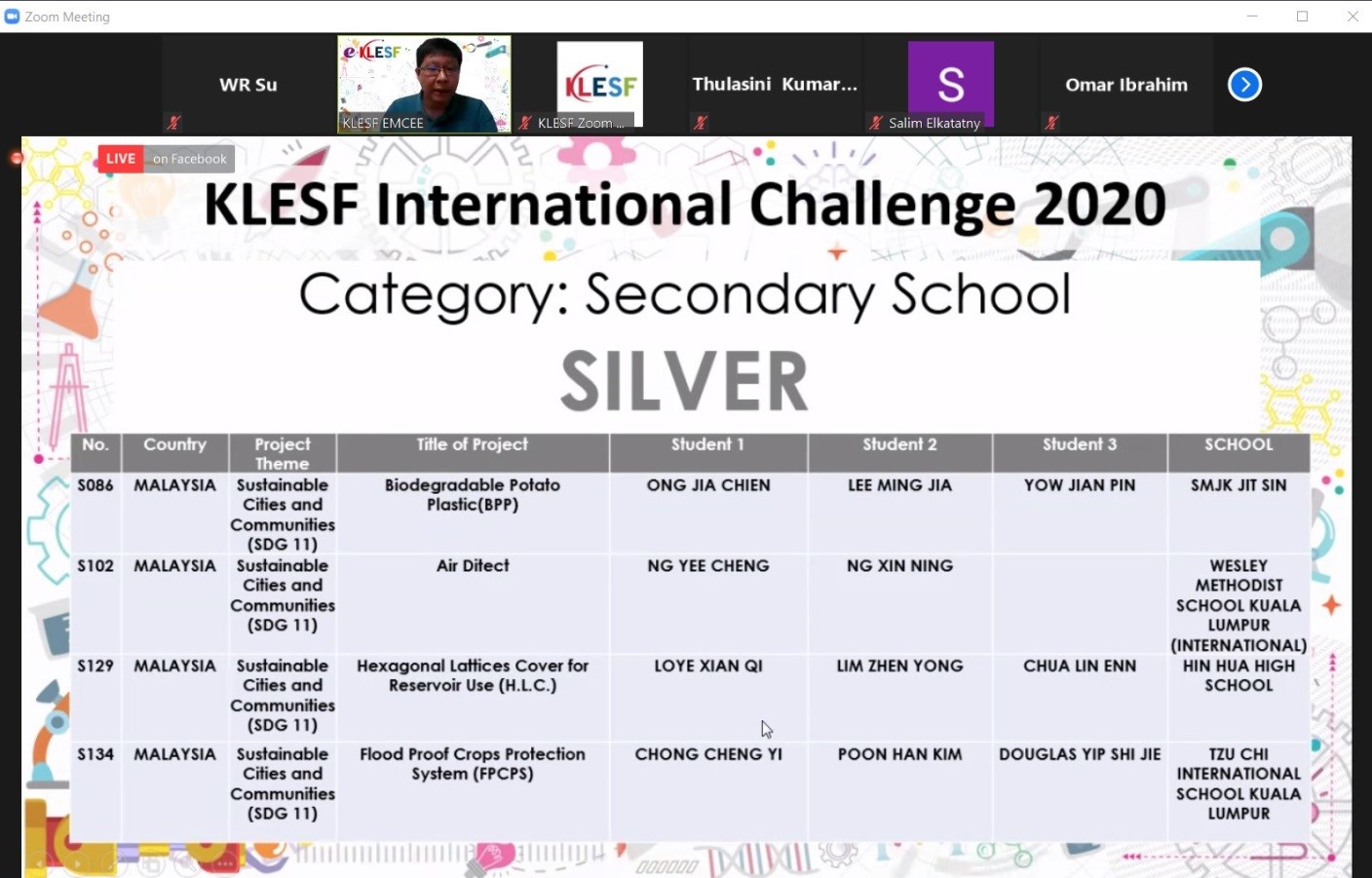
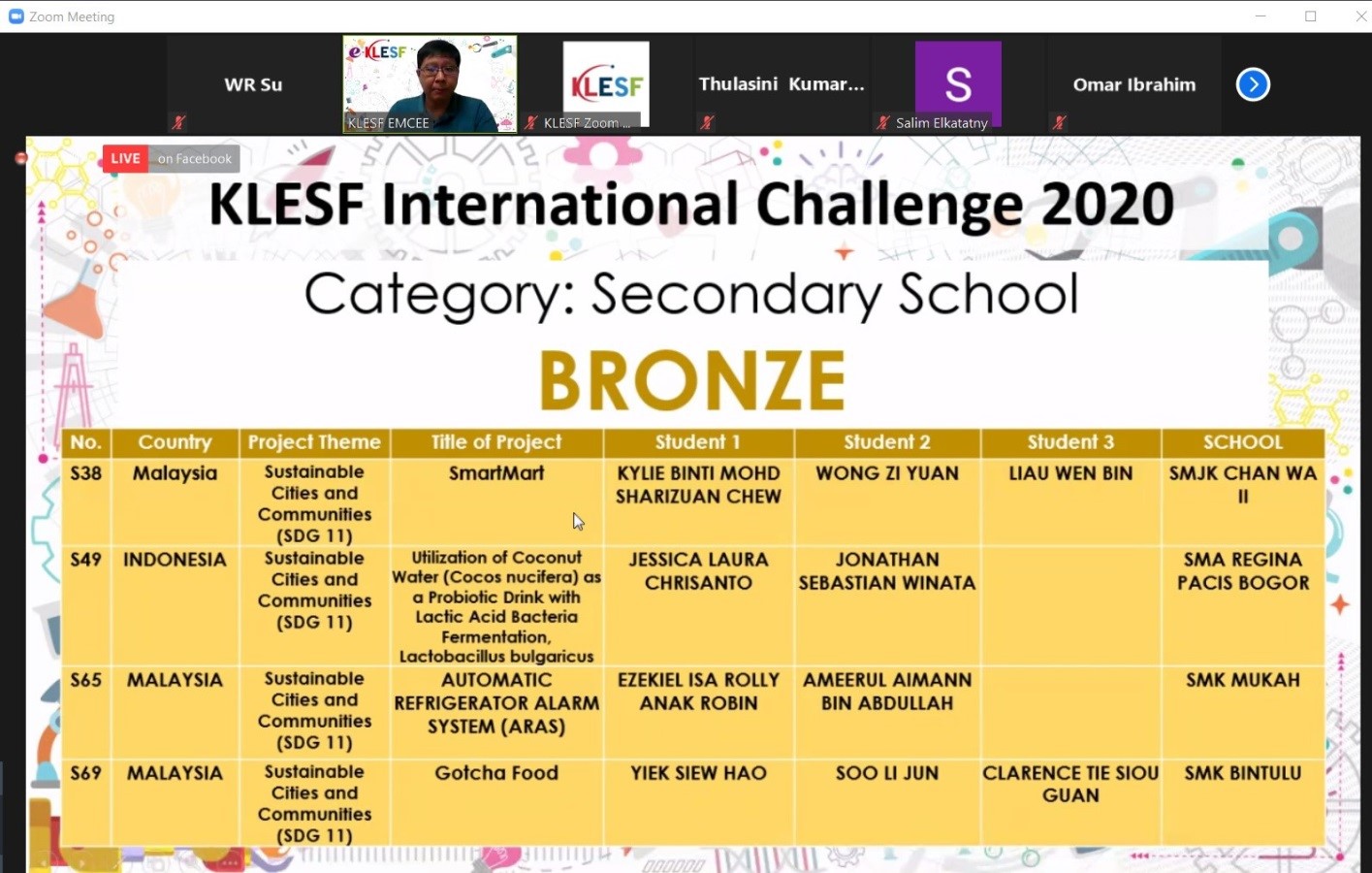
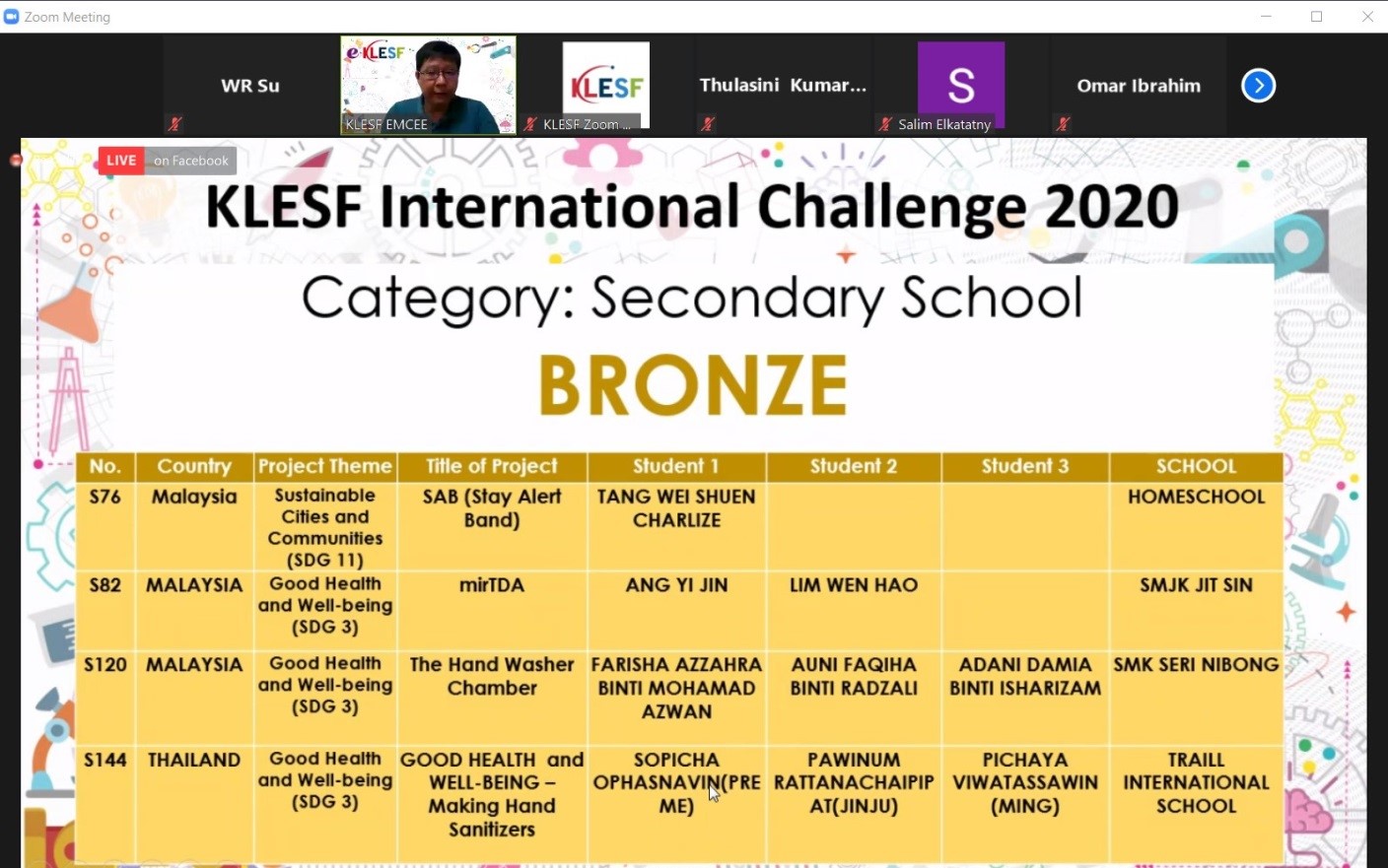
Category: Secondary school (13 - 18 years old) 
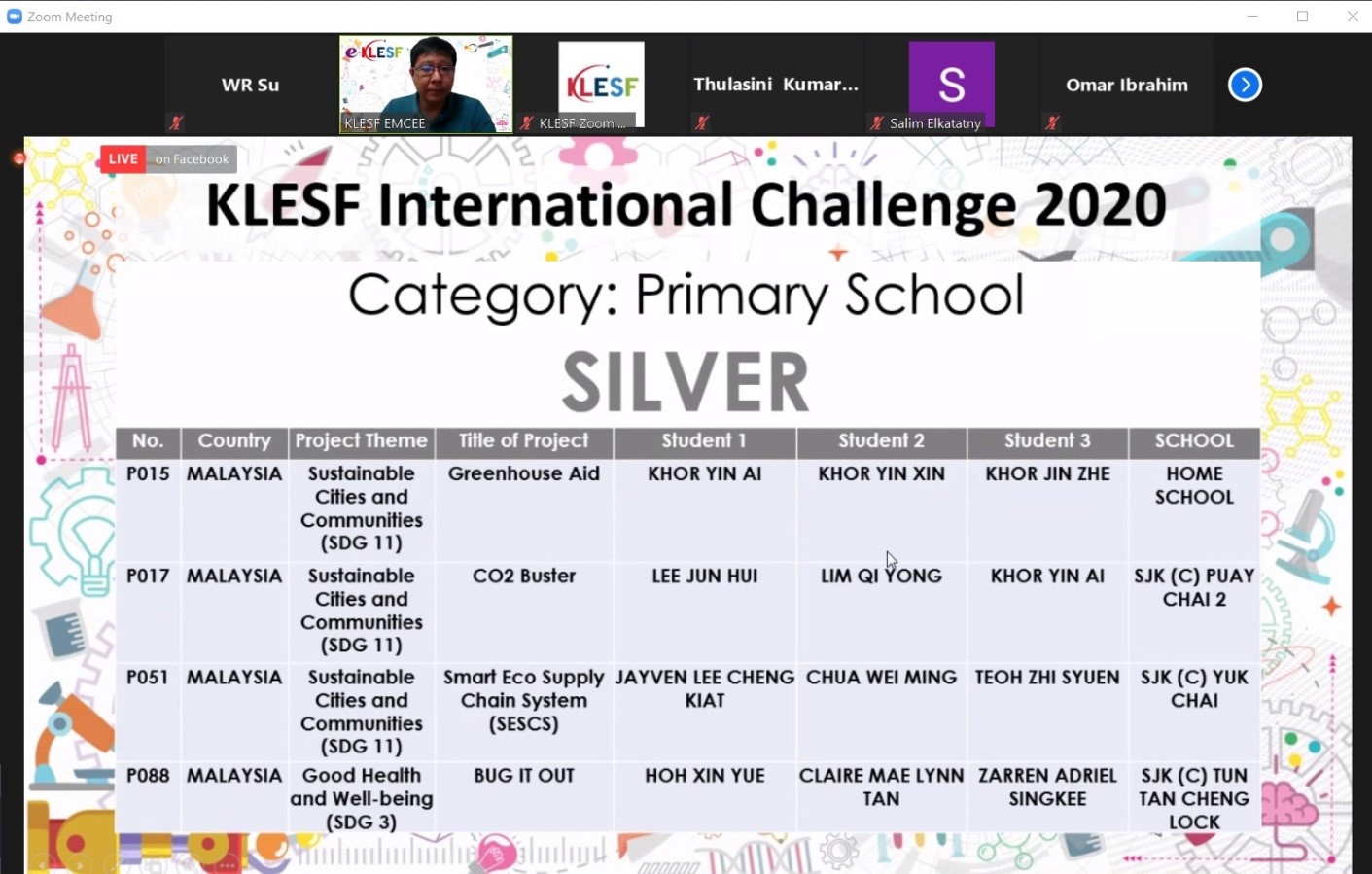

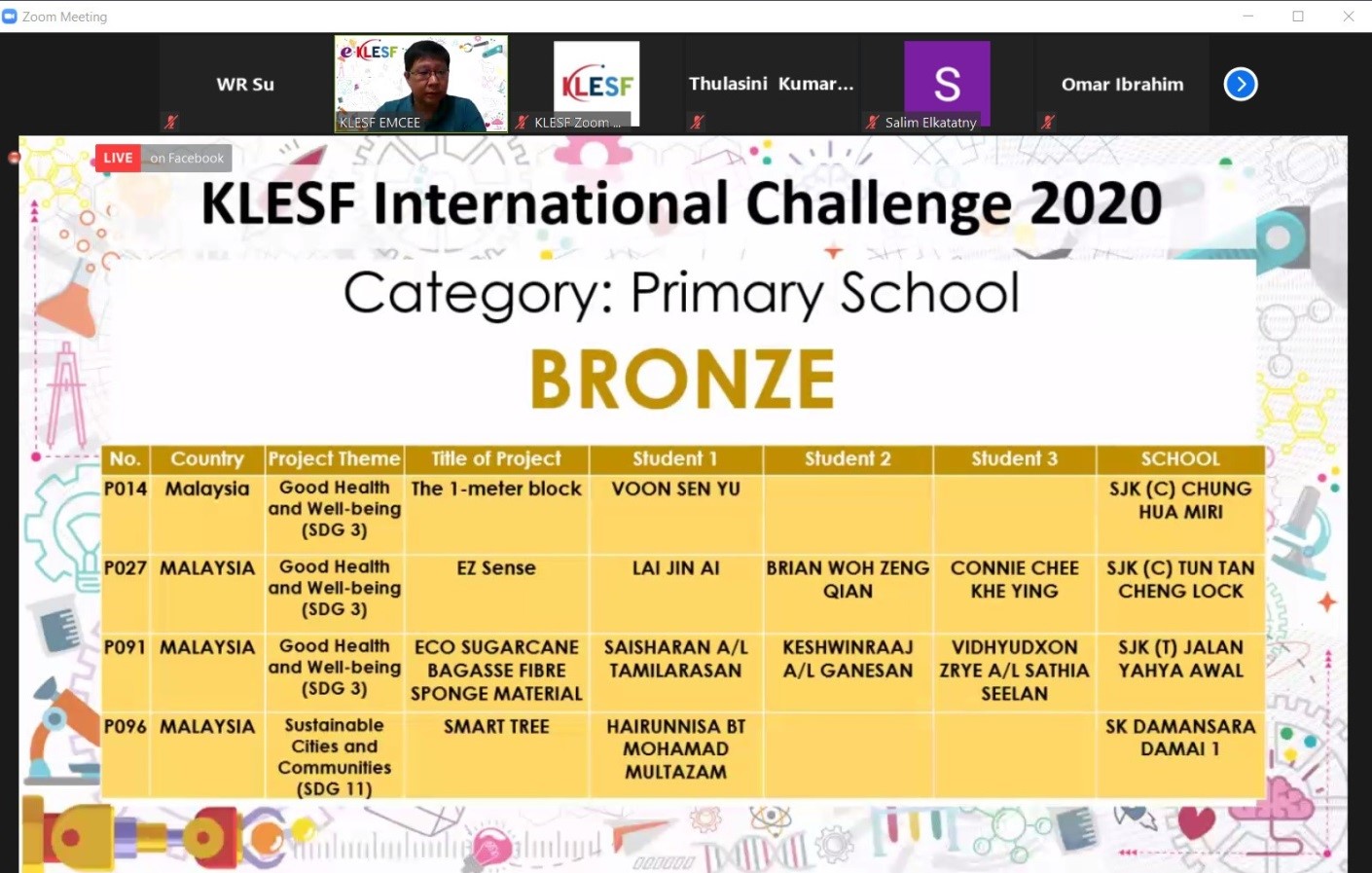

Most "liked" and "shared" video |